2017年考研英语基础知识
- 格式:ppt
- 大小:1.37 MB
- 文档页数:87
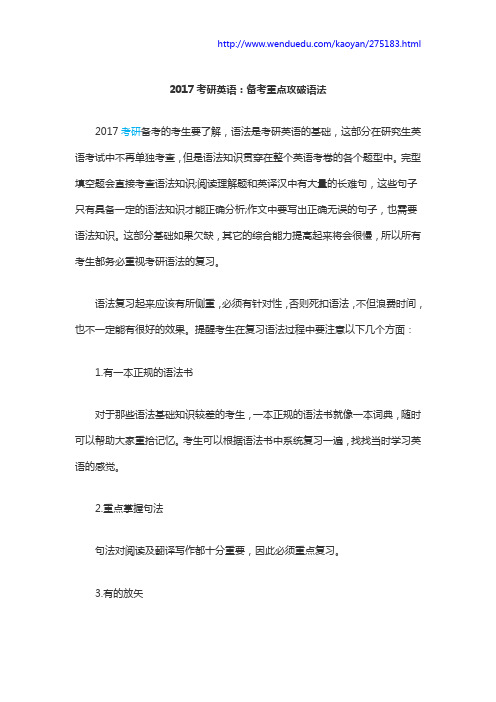
2017考研英语:备考重点攻破语法2017考研备考的考生要了解,语法是考研英语的基础,这部分在研究生英语考试中不再单独考查,但是语法知识贯穿在整个英语考卷的各个题型中。
完型填空题会直接考查语法知识;阅读理解题和英译汉中有大量的长难句,这些句子只有具备一定的语法知识才能正确分析;作文中要写出正确无误的句子,也需要语法知识。
这部分基础如果欠缺,其它的综合能力提高起来将会很慢,所以所有考生都务必重视考研语法的复习。
语法复习起来应该有所侧重,必须有针对性,否则死扣语法,不但浪费时间,也不一定能有很好的效果。
提醒考生在复习语法过程中要注意以下几个方面:1.有一本正规的语法书对于那些语法基础知识较差的考生,一本正规的语法书就像一本词典,随时可以帮助大家重拾记忆。
考生可以根据语法书中系统复习一遍,找找当时学习英语的感觉。
2.重点掌握句法句法对阅读及翻译写作都十分重要,因此必须重点复习。
3.有的放矢通过对大纲的研读,以及对历年真题的分析和统计,得出考研英语常考的重点的语法知识包括:名词、代词的数和格的构成及其用法;动词时态、语态的构成及其用法;形容词与副词的比较级和最高级的构成及其用法;常用连接词的词义及其用法;非谓语动词(不定式、动名词、分词)的构成及其用法;虚拟语气的构成及其用法;各类从句(定语从句、主语从句、表语从句等)及强调句型的结构及其用法;倒装句、插入语的结构及其用法等。
复习中要重点把握考研考查的语法体系,而不要陷入了盲目学习的误区。
4.以真题为依托如果单纯地看语法书,那一定会很枯燥,学习效果也不好,跟真题中出现的语法长难句结合起来复习,不仅可以检验语法知识的掌握情况,还有助于深刻地了解真题中语法的考查角度。
看语法书的同时,要对基本的语法知识进行整理,形成一个体系,也要对一些特殊的语法现象进行归纳,要手眼并用,不能只看不动手。
另外,语法复习重在语法现象本身,而不是记住那些枯燥无味的术语。

2017考研英语基础班讲义二〇一五年主编:Ada 司内部讲义翻版必究并列句一.定义:You may go with us, or you may stay at home.It was getting late; we had to go back.二.并列句连词1.表示转折关系的并列连词有:but, yet , nevertheless, while2.表示因果关系的并列连词有:for3.表示并列附加关系:and,not only…but also4.表示选择关系的:either…or neither….nor or三.并列句中的省略现象Its scientists were the world's best, its workers the most skilled.It is said that in England death is pressing, in Canada inevitable and in California optional.He adds humbly that perhaps he was superior to the common run of men in noticing things which easily escape attention, and in observing them carefully.(08)定语从句一.什么是定语二.定语的种类定语前置a lovely girl twenty students定语后置He give me a basket full of eggsA film about the life of workers.The ability to modify the environment.三.定语从句含义用句子做定语,放在被修饰对象的后面。
These are useful booksThese are the books which I needed in my research.区分:从句作定语和单词作定语的区别总结:定语从句的结构先行词+关系词+从句=定语从句四.定语从句的模式(一)先行词1.一个名词Even when homeless individuals manage to find a shelter that will give them three meals a day and a place to sleep at night…2.一个短语或者从句作名词概念We are obliged to them because some of these languages have since vanished, as the peoples who spoke them died out or became assimilated and lost their native languages.(2004年翻译)What the were seeing were the patterns and structures that existed 15 billion ago.3.一个完整的句子He arrived an hour later, which annoyed his girlfriend very much.(二)关系代词which/who/whom/that/whose1.关系代词指代人That/who都可以充当从句的主语,宾语或者标语,但是,若先行词后出现逗号,这时的定语从句只能用who引导。
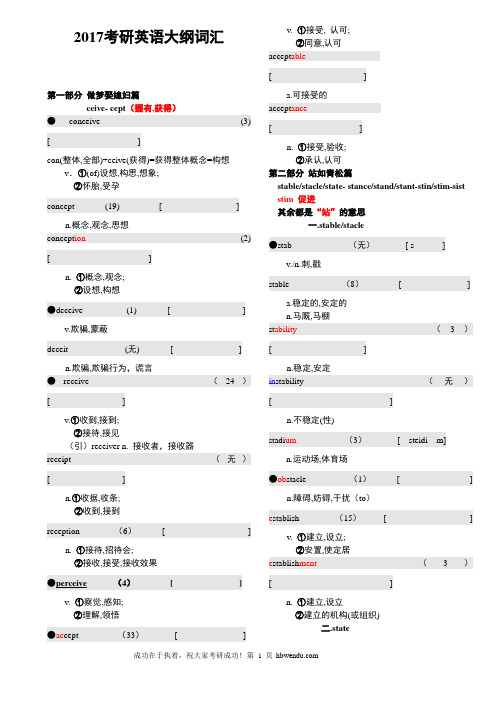
2017考研英语大纲词汇第一部分 做梦娶媳妇篇ceive- cept (握有,获得)●conceive(3)[] con(整体,全部)+ceive(获得)=获得整体概念=构想 v .①(of)设想,构思,想象; ②怀胎,受孕 concept (19) [] n.概念,观念,思想 concept ion (2)[ ]n. ①概念,观念;②设想,构想●deceive (1) [] v.欺骗,蒙蔽 deceit (无) [ ] n.欺骗,欺骗行为,谎言 ●receive (24) [] v.①收到,接到; ②接待,接见(引)receiver n. 接收者,接收器receipt (无) [] n.①收据,收条;②收到,接到reception (6) [] n. ①接待,招待会; ②接收,接受,接收效果 v. ①察觉,感知; ②理解,领悟●ac cept (33) [] v. ①接受, 认可;②同意,认可accept able [] a.可接受的accept ance[] n. ①接受,验收;②承认,认可第二部分 站如青松篇 stable/stacle/state- stance/stand/stant-stin/stim-siststim 促进其余都是“站”的意思一.stable/stacle ●stab (无) [ s ]v./n.刺,戳stable (8) [] a.稳定的,安定的n.马厩,马棚st ability (3) [ ] n.稳定,安定in stability(无)[] n.不稳定(性)stadi um (3) [ steidi m]n.运动场,体育场 ●ob stacle (1) [] n.障碍,妨碍,干扰(to )e stablish (15) [] v. ①建立,设立;②安置,使定居 e stablish ment (3) [] n. ①建立,设立②建立的机构(或组织)二.state●e state (2) [i steit]n.房地产,地产state (82) [ ] n. ①状态,情况;②国,州v. ③陈述,说明 ④规定state ment [ ] n.声明,陈述states man [] n.政治家,国务活动家 stat ic(al) (无) [] a.静态的,静力的 ●station (8) [] n.车站;所,站,局;身份,地位 v.安置,驻扎 station ary(2)[ ] a.静止的,固定的station ery(无)[ ] n.文具 ●statistical(3)[ ] a.统计的,统计学的[ ] n.统计(学) 注:-ics 学科stat ue (无) [ ] n.塑像,雕像 stat ute(无)[ ] n.法规,章程,规则stat us (17) [ ] n. ①地位,身份;②情形,状况三.stance/stand/stant ●circum stance(9)[] n .①[pl.]情况,形势,环境;②经济情形,境况in stance (7) [] n.例子,事例,例证in stant (4) [] a.①立即的,直接的;②紧迫的;③(食品)速溶的,方便的n.瞬间,时刻instant aneous(1)[ ] a.瞬间的,即刻的instant ly(2)[] ad.立即,即刻●sub stance (26) [] n. ①物质, 实质;②财产,财物 ③大意;a. ①实质的,真实的;②坚固的,结实的;③富裕的stand [] v.①站,站立;②坐落,位于; ③坚持,维持原状; ④经受,忍受 n.台,座standard (29) [] n.标准,规则a.标准的standard ize(3)[] v.使符合标准,使标准化●con stant (9次)[]a.①经常的,不断的;②坚定的,永恒的③忠实的stand point (无)[]n.立场,观点di stance (11)[] n.距离,间隔,远方,路程di stant (7)[]a.远的,久远的四.stim/stin 篇●stim ulate (4次)[]v.①刺激, 使兴奋;②激励,鼓舞sting (无)[]v./n.①刺,刺痛,剧痛;②刺,叮stir (2)[]v.①搅拌,搅动;②摇动;③激动;④轰动;⑤煽动,鼓动stir up 激起,鼓动,煽动stitch (无)[] n.一针,针脚v.缝,缝合●ob stinate (无)[]a.顽固的,固执的di stinct (14)[] a.①清楚的, 明显的;②(from)截然不同的di stinct ion[]n.差别,区分di stinguish (10)[]v.①(from)区别,辨别;②辨认出;③使杰出五.sist 篇●ex ist (37)[]v.存在;生活exist ence[]n.①存在,实在;②生存,生活(方式)exist ent[]a.存在的non existent 不存在的●as sist (18)[] v.帮助,援助,协助assist ance[]n.帮助,援助assist ant[]n.助手,助教a.辅助的,助理的v.(in)在于,存在于;(of)由…组成,由...构成consist ent (7)[]a.①(with)前后一致的②始终如一的●in sist (9)[] v.(on)坚持要求, 坚持(强调坚决主张)per sist (5)[]v.(in)坚持,持续(强调一种精神)●re sist (3)[] v.①抵抗, 反抗;②抗,忍得住,抵制resist ance (2)[]n.①(to)抵抗,反抗;②抵抗力,阻力;③电阻resist ant(3次)[]a.(to)抵抗的,有抵抗力的第三部分飞刀切菜篇cad/case/cide-cise/cide-pend/pense-set/stall/pose-press-here落-切-悬-放-压-粘一.cad/case 篇dec ade (23)[] n.十年dec 十dec imal 十进(制)的decay (无)[] v./n.①腐朽,腐烂;②衰减,衰退case (35)[]n.①箱,盒,容器;②情况,事实;③病例;④案件cash ier (无)[] n.收银员,出纳员cash (14)[ ] n.现金,现款v.兑现,付(或收)现款cas ual (6)[]a.①偶然的, 碰巧的;②临时的,非正式的casualty (1)[] n.①伤亡人员;②受害人occasion (3)[] n.①场合, 时节, 时刻;②时机,机会occasion al (5)[]a.①偶然的,非经常的,特殊场合的;②临时的;③不时的二.cide/cise 篇●de cide (16)[] v.①决定, 下决心;②解决,裁决decided (5)[]a.①决定了的的,坚决的;②明显的,明确的decision (24)[] n.①决定,决心;②决议;决策decisive (2)[]a.①决定性的;②明确的;③果断的;de term ine (25)[] v.①决心,决定;(强调坚忍不拔)②确定,限定a.精确的,准确的precis ion(2)[] n.精确,精确度con cise (2) [ ] a.简明的,简洁的●sui cide(10) [] n.自杀,自取灭亡ac cid ent (14) [ ] n.①事故;②意外的事,偶然的事 ac cid ent al(1)[] a. 偶然的,意外的―ly adv.in cid ence (1) [] n.发生(率)in cid ent (8) [] n.事件,事变 incident ally (1)[] ad.附带地,顺便提及co in cide (无)[] v.和...一致,相符,相同coincid ence (2)[] n. ①巧合,巧事; ②一致,符合 三. pend/pense 篇 ●de pend (23) [] v. ① (on/upon) 取决于, 依靠②信赖,相信depend ence (4) [] n.(on)依靠;依赖;信赖 depend ent (6) [] a. ①依靠的, 依赖的②从属的;随...而定的 in dependence (5) [] n.独立,自主in 相反in depend ent(15)[ ] a.(of)独立的,自主的in 相反 in dispensable(3)[] a.(to,for)必不可少的,必需的 in 相反●sus pend (3) [] v. ①吊, 悬挂;②推迟,暂停sus pense (无) [ ] n.悬而未决,不确定sus pens ible (无) [] a.可吊的,可悬浮的,可悬挂的append ix (无) [] n.附录,附属物四.set/stall●set [ ]n.①(一)套,(一)副,(一)批;②机组,接收机v.①放,安置;②树立,创造;③调正,校正;④落山,下沉a.不变的,固定的,规定的setting (3) [] n.①安置,安装;②落山;③(固定东西的)柜架底座;④环境,背景set tle (12) [] v.①安定, 安顿; ②停息;③定居;④解决,调停settle ment (4)[] n.①解决, 决定, 调停;②居留区,住宅区●stall (1)[] n.①货摊;②畜栏,厩v.(使)停转,(使)停止in stall/instal (3)[]v.安装,设置install ation(无)[]n.①安装,设置;②装置,设备install ment(无)[]n.①分期付款;②就任,就职五. pose●dose (1)[]n.剂量,一服,一剂v.(给...)服药pose []v.①造成(困难等);②提出(问题等),陈述(观点等);③摆姿势;④假装,冒充position (10)[] n.①位置;②职位,职务;③姿势,姿态;④见解,立场,形势positive (8)[]a.①确实的,明确的;②积极的,肯定的;③正的,阳性的;④十足的,完全的n.(摄影)正片●im pose (6)[] v.①征(税);②(on)把...强加给ex pose (8)[] v.①(to)使暴露,受到;②使曝光expos ure (1)[] n.①暴露,揭露;②(to)受到dis posal (无)[] n.①处理,处置;②布置,安排dis pose (2)[] v.①(of)处理,处置;②(for)布置,安排de pos it(2)[] v.①存放;②储蓄;③使沉淀;④付(保证金)n.①存款,保证金;②沉积物deposit ion(无)[,]n.沉积作用,沉积物op pose (7)[]v.反对,反抗oppos ite(9)[]a.(to)对面的,对立的,相反的n.对立面,对立物prep.在...的对面●sym posium (2)[,]n.①讨论会, 专题报告会;②专题论文集de compose (无)[]v.分解com pose (5)[] v.①组成, 构成;②(of)由...组成;③创作(作曲,诗歌等)composit ion(15)[] n.①作品,作文, 乐曲;②写作,作曲;③结构,组成,成分pre position (无)[]n.介词pur pose (26)[] n.①目的, 意图;②用途,效果pro posal (2)[] n.①提议, 建议;②求婚pro pose (5)[]v.①提议, 建议;②提名,推荐;③求婚pro position (3)[]n.①主张, 建议;②陈述,命题sup pose (7)[]v.①料想, 猜想;②假定,以为;③[用于祈使语句]让,没六.press 篇●press [] v.①压,揿,按;②压榨,压迫;③紧迫,催促,逼迫n.①报刊, 出版社, 通讯社; ②压榨机,压力机;③压,揿,按press ure (10)[] n.①压(力);②强制,压迫,压强im press (4)[] v.①(on) 印, 盖印;②留下印象,引人注目n.印记impress ion(4)[] n.①印象, 感想;②盖印,压痕impress ive(1)[]a.给人深刻印象的,感人的ex press (32)[] v.表达,表示a.特快的,快速的n.快车,快运ex pression[]n.①表达,表示;②词句,措词;③式,符号●de press (9)[] v.①压抑, 降低;②使沮丧,压下op press (1)[]v.压迫,压制sup press (1)[] v.①镇压, 压制;②抑制,忍住;③查禁com press (1)[] v.压缩,浓缩●pess imistic (1)[]a.悲观(主义)的optimistic (8)[ ] a.乐观主义的optim ize (无) [] v.使优化七.here 篇 ●co herent (无) [] a.粘着的,粘附的in herent (2) [] a.固有的,内在的,天生的in her it (无) [] v.继承 ad here (无) [ ] v.①(to)粘附,胶着; ②坚持her it age(1)[] n. ①遗产,继承物;②传统●her [ ]pron.[she 的宾格]她;[she 的所有格]她的herd (无) [] n.群,兽群,牛群v.放牧,群集here [ ]ad.①这里,在这里;②从这里,到这里; ③在这一点上,这时hero (5) [] n. ①英雄, 勇士;②男主角,男主人公heroin e (无) [] n. ①女英雄; ②女主角heroin (3) [] n.海洛因hero ic (无) [] a.英雄的,英勇的●hers [] pron.[she 的物主代词]她的(东西)herself[] pron.她自己,她亲自,她本人he sit ate (4) [] v. ①犹豫,踌躇;②含糊,支吾hesitat ion (无) [ ] n.犹豫,踌躇highjack (无 ) [` ] v. 抢劫,劫持,揩油第四部分 女子十二乐坊篇 feas/feat/fect- fic/fac/fact- ag/act/oper- feit/fit/labor 做一. feas/feat●feas ible (无) [] a.可行的f east (无) [] n.①节日;②宴会feather (无) [] n.羽毛feat ure (9) [] n. ①特征,特色;②特写二. feat/fect/fic●de feat (5)[] v./n.战胜,挫败n.失败de fect (2)[] n.缺点,缺陷de ficiency (1)[]n.①缺乏,不足;②缺陷de ficit (无)[]n.赤字,逆差●ef ficiency (10)[]n.①效率;②功效ef fici ent(10)[]a.①有效的, 效率高的;(in-)②有能力的,能胜任的suf ficient (14)[]a.(for)足够的,充分的in sufficient (3)[]a.(for,of)不足的,不够的pro ficiency (2)[]n.(in)熟练,精通●ef fect (66)[] n.①(on)作用,影响;②结果;③效果,效力v.产生,招致ef fect ive[]a.有效的,生效的af fect (19)[] v.①影响;②感动affect ion (1)[] n.①爱,慈爱,感情;②影响●per fect (5)[]a.①完善的, 无瑕的;②完全的,十足的;③[语法]完成的v.使完美,改进perfect ion (无)[] n.尽善尽美,完美perfect ly (1)[]ad.很,完全●super ficial (3)[]a.①表面的;②肤浅的,浅薄的art i fic ial (7)[]a.①人工的, 人造的;②人为的,娇揉造作的office (26)[] n.①办公室,办事处;②职务,公职;③部,局,处offic er (4)[] n.①官员, 办事员;②工作人员;③军官offic ia l (11)[] n.官员,行政官员a.①官方的,官方的,②正式的,公务的三. fac/fact-ag 篇●fac ulty (2) [ ] n. ①才能;②学院,系;③ (学院或系的)全体教学人员 fac ility (无)[ ] n. ①灵巧, 熟练;② [pl.]]设备,设施,便利条件 fac ilitate (1)[] v.使变得(更)容易,使便利●fact or (15) [] n.因素,要素fact ory [] n.工厂fact (50) [] n.事实,实际ex ag gerate (2)[] v.夸大,夸张四.act 篇●act [ ]v.①行动,做事;②(on)起作用; ③表演 n.①行为,动作;②(一)幕; ③法令,条例 act ion (17) [] n.①行动, 行为; ②动作,活动; ③(on)作用 act or [ ] n.男演员actr ess [ ] n.女演员●re act (8) [ ] v. ①反应, 起作用;② (against)反对,起反作用 react ion[] n.反应 react or(无)[] n.反应堆●inter act (17) [ ] v.互相作用,互相影响 interact ion[] n.互相作用,互相影响●act ive (12) [] a.有活力的,活跃的,敏捷的,在活动中的activ ate (4) [] v.使活动,起动activ ity (12)[] n.①活动;②活性,活力act ual (24) [] a.实际的,现实的 ●ex act (14) [] a.确切的,正确的,精确的exact ly[] ad.确切地,精确地,恰好 五.oper 篇 ●opera (2) [] n.歌剧oper ate (4) [] v. ①运转,开动;② (on)动手术,开刀,(对...)施行手术operat or (无) [] n. ①操作人员 ②(电话)接线员 operat ion (13)[] n.①运转, 开动, 操作; ②(on)手术; ③运算operation al (1)[] a.操作的,运转的 ●co operate (2) [ ] v.(with)合作,协作,相配合 cooperat ive(4)[ ] a.合作的,协作的n.合作社六. feit/fit/laborcount [] v.①数,计算;②算入; ③看作,认为 n.计数,计算,总数counter [ ] n.①柜台;②计数器 a./ad.相反(的) v.反对,反击counter part(3)[] n.对应的人(或物) counter feit (无) [] v.伪造 for feit (无) [] n.没收;罚金●bene ficial (3)[] a. (to) 有利的, 有益的bene fit (27) [] n.利益,好处,恩惠v. ①有益于; ② (from,by)受益 ●pro fit (18) [] n.利润,收益,益处v. ① (by,from)得利,获益;②利用;有利于 profit able [] a.有利可图的,有益的●favor/favour (19) [ ] n.①恩惠,帮助;②好感,喜爱 v.①赞成,支持 ②偏爱,偏袒favor able /favourable [ ] a.赞许的,有利的,顺利的 favor ite /favourite [ ] n.最喜欢的人或物a.特别喜欢的,中意的 ●col labor ate(无)[] v.协作,合作e labor ate (4) [ i] a.详尽的,精心的v.精心制作,详细说明 第五部分 美女的心事篇man - mini - miss/mit/port-move/mobe/mote/mate/cur/trol- flu/fuse人、手-小-出去-运动-流动一.男人篇●male []n./a.①男性(的)②雄性(的)mal function (无)[] n./v.①失灵;②功能失常mal treat (无)[] v.虐待●man [ ]n.①男人;②人类,人manage []v.①经营, 管理, 处理;②设法,对付;③操纵,运用manager []n.经理,管理人manage ment(19)[] n.①经营,管理;②管理部门●manifesto (1)[]n.宣言manifest (8)[] v.表明,证明,显示a.明白的,明了的mani pul ation (2)[]n.①操作;②控制;③应付manipul ate (2)[]v.①操作, 控制;②应付,处理●man ner (18)[]n.①方式, 方法;②举止; ③[pl.]风度,礼貌;④规矩;⑤风俗man ly(无)[]a.男子气概的,果断的man kind (6)[] n.人类●manu al (2)[]a.手的,手工做的,体力的n.手册,指南manu fact ure (6)[]v.制造,加工n.①制造, 制造业;②产品manu script (1)[]n.手稿,原稿二.迷你篇●mine []pron.[I的物主代词]我的(东西)n.矿,矿山,矿井v.①采矿;②布雷min er[]n.矿工miner al(2)[]n.矿物,矿石a.矿物的,矿质的●mini stry (无)[]n.①(政府的)部;②牧师mini ster (3)[] n.部长,大臣ad ministrate/administer(无)[ ] v.①掌管,料理...的事务;②实施,执行; ③给予,投(药)administrat ion(5)[] n.①管理,经营;②行政(机关,部门); ③政府●mini ature (无) [ minj t ]n.缩小的模型,缩图a.微型的,缩小的mini m ize /minimize (无) [] v.①使减少到最少②使降到最低mini mum (3) [] n.最小值,最低限度a.最小的,最低的maxi mum (2) [] n.最大值,极限a.最大的,最高的min or (3) [] a.较小的,较小的,较次要的n.兼修学科 v.(in)兼修maj or (30) [ ] a.(较)大的,(较)重要的n.①专业,主修科目; ②专业学生; ③少校v.(in)主修,专攻minor ity [ ] n.少数,少数派,少数民族 major ity [] n.多数,大多数●min us (无) [] a.负的,减的prep.减去 n.负号,减号plus (1) [] prep.加上a.正的,加的 n.加号,正号di minish (4) [] v.缩小,减少,递减pro minent (1) [ ] a.①突起的,凸出的;②突出的,杰出的 三.Miss/mit/port 篇●miss [ ]n.[Miss]小姐v.①未击中, 错过, 没达到; ②惦念;③(out)漏掉,省去miss ile (无) [] n.导弹,发射物missing (6) [] a.漏掉的,失去的,失踪的●miss ion (5) [] n.①使命, 任务;②使团,代表团sub mission (无) [ ] n.提交,呈送com mission (4) [ ] n .①委员会;②委任,委托(书),代办; ③佣金,手续费 per mission(3)[] n.允许,同意ad mission (3) [ ] n.①允许进入,接纳,收容;②承认●e mission (2) [] n.散发,发射e mit (1) [] v.散发,发射trans mission (2) [] n.①播送,发射; ②传动,传送 trans mit (4) [ ] v.①传播,发射; ②传递,传导●sub mit (2) [ ] v.①(to)使服从,屈服;②(to)呈送,提交com mit (9) [] v.①把...交托给,提交;②犯(错误),干(坏事)per mit (4) [] v.许可,允许n.许可证,执照ad mit (9) [] v.①让...进入,接纳; ②承认 ●com mittee (9) [ ] n.委员会,全体委员dis miss (4) [ ] v.①免职,解雇,开除 ②解散 inter mittent(1)[] a.间歇的,断断续续的●port [ ] n.港口port able (无) [] a.轻便的,手提(式)的port er (无) [] n.①搬运工人;②门房port ion (3) [] n.一部分,一份port rait(无)[] n.肖像,画像●ex port (7) [] v./n.输出,出口 n.出口商品im port (4) [] v.进口,输入 n.①进口, 输入;②[pl.]进口商品,进口物资; ③要旨,含意 import ance(77)[] n.重要,重要性import ant [] a.①重要的, 重大的;②有地位的,有权力的 ●op port unity(12)[] n.机会pro portion(11)[] n.①比例;②部分,份儿; ③均衡,相称report (49) [] n.①报告,汇报;②传说,传阅 v.报告,汇报,报到report er [ ] n.①报告人,通讯员;②记者,报导者四.动心篇●move (41) [] v.①移动,搬家 ②活动; ③感动,激动 n.移动,活动,行动move ment [] n.①运动,活动;②移动,迁移re move (9) [] v.①排除,消除;②搬迁,移动,运走re mov al (无) [ri mu:v l]n.①移动, 迁居; ②除去●mov ie (3) [ ] n.电影,电影院re mote (7) [ ] a. ①远的,长久的;②偏僻的; ③关系疏远的;pro mote (6) [t] v.①促进,发扬;②提升,提拔; ③增进,助长mob ile (2) [ ] a.可动的,活动的,运动的 mobil ize /mobilise (无)[] v.动员●auto [ ] n.汽车 auto mobile(3)[] n.汽车mot or (12) [] n.发动机,电动机motor way (1) [] n.高速公路●mot ion (10) [] n.①运动,动;②提议,动议 v.提议,动议mot ive (3) [ ] n.动机,目的a.发动的,运动的e motion (18) [] n.情绪,情感●auto matic(5)[ ] n.自动机构a.自动的,无意识的,机械的 auto mation(1)[] n.自动(化)●cur rency (无) [] n.通货,货币cur rent (12) [] n.①电流, 水流, 气流;②潮流,趋势a.①当前的, 现在的; ②通用的,流行的oc cur (18) [] v.①发生,出现; ②想起,想到occurr ence [] n.①发生,出现;②事件,事故,发生的事情in cur (无) [:] v.招致,惹起,遭受con trol (58) [] n.(over)控制,支配 v.控制,支配五.流泪篇●in fluence (23) [] n.① (on) 影响,感化; ②势力,权势 v.影响,感化 in fluent ial (2)[] a.①有影响的;②有权势的 super fluous (无) [] a.过剩的,多余的●flu [] n.流行性感冒 flu id (无) [ ] a.流动的,液体的n.流体,液体 flu ent(无) [ ] a.流利的,流畅的flu ctuate(1) [t] v.使波动,使起伏flu sh (1) [ ] v.冲洗,奔流n./v.脸红a.(with)齐平的,同高的●fuse [] n.保险丝,导火线,引信v.熔化,熔合dif fuse (1) [] v.①扩散;②传播,散布a.①(文章等)冗长的,漫无边际的;②四散的,弥漫的 con fuse (6) [] v.使混乱,混淆confus ion[] n.混乱,混淆 re fusal (1) [] n.拒绝,回绝re fuse (11) [] v.拒绝,谢绝n.废物,垃圾●re fute (1) [] v.反驳,驳斥re fuge (2) [] n.避难处,藏身处 fut ure (25) [] n.①将来,未来;②前途,前景a.将来的,未来的第六部分 嫂夫人与赛先生soph – sci – techn – form 智慧-科学-技术-形式一.soph 篇●soph omore (无)[] n.(大学)二年级学生phil o soph er (8) [ ] n.哲学家,哲人 phil o soph y(5)[ ] n.哲学 soph is ti cat ed(1)[ ] a.①尖端的,复杂的,先进的;②老练的,老于世故的naïve (1) [ ] a.天真的二.sci 篇●science (97) [] n.①科学;②学科con science (无) [] n.良心,良知 scientif ic (61) [] a.科学上的scient ist (58)[] n.科学家 ●con scious (18) [] a. ① (of) 意识到的, 自觉的; ②有意识的,神志清醒的 conscious ness (1) [] n.意识,觉悟,自觉con sci entious (无) [ ] a.认真的,勤勤恳恳的 三.techn 篇●techn ical (15) [ ] a.技术的,工艺的 technic ian(1)[] n.技术员,技师,技工 techn ique (6) [] n.①技术,技能;②工艺techn ology (41) [ ] n.工艺,技术 technolog ical(13)[ ] a.工艺的四.form 篇●uni form (1) [] n.制服,军服 a.相同的,一律的platform (1) [] n. ①平台,台;②站台,月台;③政纲,党纲form [] n.①形状,形式;②表格v.①组成,构成;②形成form al (13) [] a.①正式的;②形式的 for um (1) [] n.论坛,讨论会●in form (12) [ ] v.① (of, about) 通知, 告诉, 报告; ②告发,告密re form (10) [ ] v./n.改革,改造,改良information (84) [] n.①通知, 报告;②情报,资料,消息;③信息form ation (5)[] n.形成,构成●de form (无) [ ] v.(使)变形 de formation(无) [] n.变形per form (17) [ ] v.①履行, 执行, 做, 完成;②表演,演出perform ance [ ] n.①履行,执行;②表演,演出; ③性能,特性per fume (无) [] n.①香味,芳香;②香水; ③香料●form er (13) [] a.以前的,在前的 latterpron.前者form ula([pl.]formulae) (无) [] n.公式,程式 form u late (6) [] v. ①构想,规划; ②系统地阐述 con form (6) [] v. ① (to)遵守,依照②符合,顺应 con firm (2) [] v. ①使更坚固, 使更坚定; ②(进一步)证实; ③确认,批准第七部分 原罪篇vig- vio- vit- viv 活力 ●vig or (无) [] n.活力vigor ous (2) [ ] a.有力,朝气蓬勃的,精力旺盛的vio let (无)[] n.紫罗兰,紫色vio lin (1) [] n.小提琴 vio late(无)[] v.违犯,违背●vio lence (3) [] n.①暴力,暴行;②激烈,猛烈vio lent (3) [ ] a.①猛烈的,激烈的;②暴力引起的,强暴的 vit amin (8)[] n.维生素vit al (4) [] a.①生死攸关的, 重大的;②生命的,生机的●re vive (2) [] v.①恢复;②(使)复苏sur vive (18) [] v.①幸免于,幸存;②比...长命surviv or (无) [] n.幸存者 surviv al (11) [] n .①幸存, 生存;②幸存者,残存物 viv id (2) [ ] a.①鲜艳的;②生动的,栩栩如生的 第八部分 野外郊游篇tin- tain- prise- hibit拿住一.tin 篇●con tinent (21) [] n.大陆,洲con tinue (28) [] v.继续,连续,延伸 continu al (4) [] a.不断的,连续的,频繁的continu ous (5) [] a.连续的,持续的 ●intimate (4) [ ] a.亲密的,密切的 in timid ate(无) [] v.恫吓,恐吓,威胁●in stinct (5) [] n.本能,直觉,天性 ex tinct (7) [ ] a.①灭绝的; ②熄灭了的 ex tinguish(1) [ ] v.熄灭,扑灭二.tain 篇●at tain (4) [] v.达到,获得de tain (无) [] v.①耽搁;②扣押,拘留con tain (10) [] v.①包含,容纳,装有; ②等于,相等于 contain er (无)[] n.①容器;②集装箱●ob tain (20) [] v.获得,得到main tain (17) [] v.①维修,保养;②维持,保持;③坚持,主张,支持mainten ance (无)[] n.①维修, 保养;②维持,保持enter tain (12) [ ] v.①招待,款待;②使娱乐;③使欢乐entertain ment[ ] n.①招待,款待;②表演文娱节目 sus tain (9) [ ] v.①支撑, 撑住;②维持,持续③经受,忍耐re tain (2) [ ] v.保持,保留三.prise 篇●enter [ ] v.走进,参加,加入 enter prise(13)[] n.①事业,企(事)业单位; ②事业心,进取心●pris on (2) [] n.监狱prison er (无) [ ] n.囚犯im prison (1) [] v.关押,监禁 imprison ment (无) [] n.关押,监禁com prise (1) [] v.包含,包括,构成(93年完型)四.hibit 篇●ex hibit (14) [] v.展出,陈列exhibit ion[] n.①展览会;②陈列,展览pro hibit (1) [] v.①禁止,不准;②阻止第九部分 恋爱三步曲 ver/verse/vert旋转 一.偶遇酒吧间 ●a ver age (19) [] n.平均(数) a.①平均的; ②通常的,一般的 v.平均,均分be verage (无)[] n.饮料con verse ly (无)[] ad.相反地 con vers ion (无) [] n.变换,转化 con vert (1) [] v.变换,转化(98年单选)conversat ion (10)[] n.会话,谈话二.恋爱大校园●ad verse (无) [] a.①相反的, 敌对的;②不利的,有害的advers ity (无) [] n.①逆境,不幸事件;②苦难,灾难,不幸经历●uni versal (9) [] a.①普遍的, 全体的, 通用的;②宇宙的,世界的uni verse (17) [s] n.宇宙,万物uni versity (21)[] n.大学 ●di verse (4) [] a.①多种多样的②(from)不同的divers ion (2) [] n.转向,转移 anni versary (无) [] n.周年(纪念日)contro versial (2)[] a.引起争论的,有争议的re verse (3) [] n.①相反,反转,颠倒;②背面,后面a.相反的,倒转的v.颠倒,倒转,(使)倒退三.矛盾千重天●verse (1) [] n.①韵文,诗; ②诗节,诗句vers ion (1) [] n.①型,版本; ②译本,译文; ③说法,看法versus/vs. (4) [ ] prep.①与...相对,与...相比;②以...为对手,对vers at ile (无)[ ] a.①通用的, 万用的;②多才多艺的,多方面的●vert ical (4) [] a.垂直的,竖的 n.垂线 advertise (14) [] v.做广告per verted (无) [] a.堕落的,变坏的,违反常情的a vert (无) [] v.①防止,避免;②转移(目光,注意力等)in vert (无) [] v.倒置,倒转,颠倒第十部分 大佛东来篇 fer 来 ●pre fer (18) [] v.(to)更喜欢,宁愿prefer able[] a.(to)更可取的,更好的 prefer ence [] n.①(for,to)偏爱,喜爱; ②优惠; ③优先选择●re fer (22) [] v.①参考,查阅,查询;②(to)提到,引用; ③提交,上呈refer ence [] n.①提及,涉及;②参考,参考书目; ③证明书(人); ④介绍(人)●suf fer (21) [ s ]v.①(from)受痛苦,患病;②受损失; ③遭受; ④忍受,忍耐●dif fer (97) [] v.①(from)与...不同;②(with)与...意见不同differ ence [] n.差别,差异,分歧differ ent [] a.差异的,差异的,不同的different iate (无)[] v.①区分, 区别;②(使)不同●con fer (10) [] v.①商谈, 商议;②授予,赋予confer ence[] n.会议,讨论会of fer (34) [] v.提供,提出,呈现,出现n.提议,提供trans fer (12)[] v.①转移,调动;②转车;③转业,转学;④转让,过户●in fer (23)[] v.推论,推断inter fere (6)[]v.①(in) 干涉, 干预;②(with)妨碍,打扰interfer ence (1)[]n.①(in)干涉,干预;②(with)妨碍,打扰●in terior (7)[]a.内部的,里面的n.内部,内地in ferior (4)[]a.①(to)下等的,下级的;②差的,次的n.下级,晚辈super ior (2)[]a.①优良的, 卓越的;②(to)较...多的,优于...n.上级,长官superior ity(1)[]n.优越性,优势circum ference (无)[]n.圆周,周围第十一部分声如洪钟篇voc/voke- phone 声音●micro phone (无)[] n.话筒,扩音器tele phone (8)[] n.电话,电话机v.打电话sym phony (无)[] n.①交响乐,交响曲;②(色彩等的)和谐,协调●ad vocate (17)[] n.提倡者,鼓吹者v.提倡,鼓吹pro voke (无)[] v.①挑动;②招惹③激发;voc abulary (41)[]n.①词汇, 词汇量;②词汇表voc ation (4)[] n.职业,行业第十二部分媒体篇med 中间●metal (2)[] n.金属,金属制品medal (5)[]n.奖章,勋章,纪念章med ical (37)[]a.①医学的, 医疗的, 医药的;②内科的med icine (13)[]n.①内服药,医药;②医术;③医学,内科学●Med iterranean (无)[]n./a.地中海(的)med ium([pl.]media) (5)[] n.①中间,适中;②媒介物,介质,传导体a.中等的,适中的med ia (13)[] n.媒体●im mediate (14)[]a.①立即的, 即时的;②直接的,最接近的inter med iate (无)[]a.①中间的,居间的;②中级的n.中间体,媒介物第十三部分打斗篇dyn/pote/fort/force- bat/fend/fense- crime力量-打斗-罪一. dyn/pote 篇●dyn amic(al) (2) []a.①动力的,电动的;②有生气的dyn asty (无) [] n.王朝,朝代pot ent (无)[]a.强有力的im potent (无)[]a.无力的omni potent (无)[]a.万能的pot ential (20)[]a.①潜在的,可能的;②势的,位的n.潜能,潜力二. fort/force 篇●com fort (3)[] n.①舒适, 安逸;②安慰,慰问v.安慰,使舒适comfort able (7)[]a.舒适的,自在的ef fort (19)[] n.努力,艰难的尝试●fort une (4)[] n.①命运, 运气;②财产mis fortune[]n.不幸,灾祸,灾难fortun ate (10)[]a.幸运的,侥幸的un fortunately[]ad.不幸地●afford (7)[] v.①担负得起,买得起,花得起(时间);②供给,给予en force (1)[] v.①实施,执行;②强制三.bat/fend/fense- crime 篇●bat (无)[] n.①球拍, 球棒, 短棒;②蝙蝠de bate (14)[] v./n.争论,辩论com bat (1)[] v./n.战斗,搏斗,格斗battle (1)[] n.①战役, 战斗;②斗争v.战斗,斗争,搏斗battery (无) [] n.①电池(组);②炮兵连,炮组●of fend (6) [] v.①冒犯, 触犯, 得罪; ②使不快,使恼火 of fense/offence (无) [] n.①犯罪, 犯规, 过错; ②冒犯,触怒 of fensive (1) [ ]a.冒犯的,攻击的n.攻势,进攻de fend (11) [] v.①防守,保卫; ②为...辩护,为...答辩 de fense/defence (1) [ ] n.①防御,保卫;②[pl.]防务工事; ③辩护,答辩●crime (12) [] n.罪行,犯罪 commit crimes 犯罪 crim in al (12) [] n.罪犯,刑事犯 a.犯罪的,刑事的 criminal activities 犯罪活动 criminal behavior 犯罪行为 dis criminate (无) [] v.①区别, 辨别;②(against)有差别地对待,歧视第十四部分 独坐深山篇 side 坐 ●pre side (17) [] v.(at,over)主持presid ent [] n.总统,校长,会长,主席re sid ence (2) [] n.住处,住宅resid ent (4) [] n.居民,常住者a.居住的●con sider (72) [] v.①认为,把...看作;②考虑,细想;③体谅,照顾consider able [] a.①相当大 (或多) 的, 可观的;②值得考虑的consider ate [] a.考虑周到的,体谅的consider ation[] n.①需要考虑的事,理由;②考虑,思考; ③体谅,照顾sub sidiary (无)[] a.辅助的,附带的,次要的 n.辅佐者,副手 第十五部分 新上帝造人说 一.神把泥土与基因和好(the-hum/terr-gene)泥土中却埋藏着恐怖1. the-hum 篇●the ory (31) [] n.①理论, 原理;②学说,见解,看法theoret ical (1)[] a.理论(上)的theor ist (无)[] n.理论家,理论工作者●hum an (120)[]a.人的,人类的n.人in human (1) []a.残忍的human ity(2)[]n.①人类, 人性, 人情;②[pl.]人文科学hum ble (4) []a.①谦卑的, 恭顺的;②低下的,卑贱的v.降低,贬抑hum iliate (1)[]v.羞辱,使丢脸●hum id (1)[]a.湿的,湿气重的humid ity (无)[]n.湿气,湿度hum or/humour (13)[] n.幽默,诙谐humor ous[]a.幽默的,诙谐的2. terr 篇terr it ory (3)[]n.①领土;②版图;③领域,范围terr ible (4)[]a.①很糟的, 极坏的; ②可怕的,骇人的;③极度的,厉害的terr ific (无)[]a.极好的,非常的,极度的terr ify(1)[] v.使害怕,使惊恐terr or (1)[] n.①恐怖;②可怕的人(事)terror ist(无)[]n.恐怖主义者3.gene 篇●gene []n.基因de generate (无)[]v.衰退,堕落,蜕化a.堕落的n.堕落者gene rate (6)[]v.产生,发生gener ation (22)[]n.①产生,发生;②一代(人)generat or(无)[]n.发电机,发生器gen uine (2)[]a.真正的,名副其实的gen i us(5)[] n.天才●gener al (64)[l]a.①一般的, 普通的;②总的,大体的n.将军general ize/generalize (1)[]v.①归纳,概括;②推广,普及gener ous(2)[]a.①宽宏大量的②慷慨的re generat ive (无)[]a.再生的,更生的二.小心-盖住,保持-平直(caut-tect-serve-rect)1.caut-tect 篇●caut ion (4)[] n.①小心, 谨慎;②警告,告诫v.警告cauti ous (4)[]a.(of)小心的,谨慎的pre caution (无)[]n.预防,谨慎,警惕●pro tect (20)[] v.(from)保护,保卫de tect (23)[] v.察觉,发觉,侦察,探测detect ive(无)[]n.侦探detect or (1)[] n.探测器2. serve 篇●pre servation (无)[] n.保藏,保存pre serve (7)[] v.①保护, 维持;②保存,保藏;③腌渍ob serv ation (5)[]n.①观察,观测,监视;②[pl.]观察资料或报告,言论ob serve (20)[] v.①遵守, 奉行;②观察,注意到,看到●re serv ation (1)[]n.①保留, 保留意见;②预定,预订re serve (5)[] n.①储备(物),储藏量,储备金;②缄默,谨慎v.①保留,储备;②预定,预约reserv oir (1)[:] n.水库,蓄水池●de serve (8)[] v.应受,值得con serv ation (4)[]n.①保存, 保护, 保守;②守恒,不灭con servative (7)[]a.保守的,守旧的n.保守主义者●serv ant(无)[] n.仆人serve []v.①服务, 尽责;②招待,侍候; ③符合,适用service (44) [ ] n.①服务, 帮助;②公共设施,公用事业; ③维修保养;④行政部门,服务机构 v.维修,保养3.rect 篇 ●di rect(137)[] a./ad.径直的 (地),直接的(地)v.①管理,指导; ②(at,to)指向,针对direct ion[] n.①方向,方位;②指令,说明 direct ly [] ad.①直接地,径直地; ②马上,立即 direct or[] n.指导者,主任,导演 direct ory[] n.人名地址录,(电话)号码簿●rect ify (2)[] v.纠正,整顿cor rect (55) [] a.正确的,恰当的,合适的,端正的 v.改正,纠正,矫正 e rect (1) [ ] v.树立,建立,使竖立 a.直立的,垂直的三.过了一百年,生出了人(pass- cent- nat) 1.pass 篇●pass [] v.①经过,走过; ②传,传递;③通过(考试等) n .①通行证,护照; ②关联,关口pass age (130) [] n.①通过,经过;②通路,走廊;③(一)段落,(一)节passeng er (7) [] n.乘客,旅客 pass ion (4) [] n.①热情, 激情, 爱好;②激怒,大怒●com pass (无) [] n.①罗盘, 指南针;②[pl.]圆规com pass ion (1) [] n.同情pass ive (1) [] a.被动的,消极的pass port (2) [] n.护照sur pass (4) [] v.超过,胜过2.cent 篇●cent [] n.①分 (币);②百 centi grade (无) [ ] centi metre/centimeter(无)[] n.厘米cent ury(57)[] n.世纪,(一)百年 per [ ] prep.①每;②经,由per cent/per cent [ ] n.百分之... percent age(4) [] n.百分数,百分率,百分比de cent (无) [] a.①体面的, 像样的; ②正派的,合乎礼仪的3.nat 篇●nat ion [] n.民族,国家nation al [] a.民族的,国家的,国立的 national ity (无) [] n.国籍,民族inter national [] a.国际的,世界的nat ive (8) [] a.①本地的, 本国的;②天生的 n.本地人,本国人nat ure (29) [ ] n.①自然界, 大自然;②性质,本性,天性nat ural (41) [] a.①正常的, 自然的; ②自然界的,天然的 ③天赋的,固有的四.第一天,人有了反应,开始-呼吸,又有了心跳及脉搏(推动)(spond/sponse-ori-spire-cord/core-pulse/pel)1. spond/sponse 篇●re spond (12) [] v.①回答, 答复; ②(to)响应re sponse (10) [ ] n.①回答,回音;②反应,响应respons ibility(12)[] n.①责任, 责任心;②职责,任务respons ible (17) [] a.①(for,to)应负责的,有责任的;②可靠的,可信赖的;③责任重大的,重要的●cor respond (46) [] v.①通信②(with)符合,一致; ③(to)相当于,对应correspond ence[] n.①通信, 信件;②(with)符合,一致;③(to)相当于,对应correspond ent [ ] n.①记者, 通讯员;②通信者correspond ing[] a.符合的,相应的,对应的●spons or (2) [] n.发起人,主力者,保证人v.发起,主办 spont aneous (1)。

2017英语二Text3Today, widespread social pressure to immediately go to college in conjunction with1 increasingly high expectations in a fast-moving world often causes2students to completely overlook the possibility of taking a gap year. After all, if everyone you know is going to college in the fall, it seems silly3to stay back a year, doesn’t it? And after going to school for 12 years, it doesn’t feel natural to spend a year doing something that isn’t academic4.But while this may be true, it’s not a good e nough reason to condemn5 gap years6. There’s always a constant fear of falling behind everyone else on the socially perpetuated7“race to the finish line,” whether that be toward graduate school, medical school or lucrative career8. But despite common misconceptions9, a gap year does not hinder10the success of academic pursuits—in fact, it probably enhances11 it.Studies from the United States and Australia show that students who take a gap year are generally better prepared for and perform better in college than those who do not. Rather than pulling students back, a gap year pushes them ahead by preparing them for independence, new responsibilities and environmental changes—all things that first-year students often struggle with12 the most. Gap year experiences can lessen the blow13 when it comes to adjusting to college and being thrown into a brand new environment14, making it easier to focus on academics and activities rather than acclimation blunders15.If you’re not convinced of the inherent value16 in taking a year off to explore17 interests, then consider its financial impact on future academic choices. According to the National Center for Education Statistics, nearly 80 percent of college students end up changing18 their majors19 at least once. This i sn’t surprising, considering the basic mandatory20high school curriculum21leaves students with a poor understanding of themselves listing one major on their college applications22, but switching to another after taking college classes. It’s not necessari ly a bad thing, but depending on the school, it can be costly23to make up credits24after switching too late in the game. At Boston College, for example, you would have to complete an extra year were you to switch to the nursing school25 from another department26. Taking a gap year to figure things out initially27 can help prevent stress and save money later on.31. One of the reasons for high-school graduates not taking a gap year is that ________.[A] they think it academically misleading[B] they have a lot of fun to expect in college[C] it feels strange to do differently from others[D] it seems worthless to take off-campus courses32. Studies from the US and Australia imply that taking a gap year helps ________.[A] keep students from being unrealistic28[B] lower risks in choosing careers[C] ease freshmen’s financial burdens29[D] relieve freshmen of pressures33. The word “acclimation” (Line 8, Para. 3) is closest in meaning to ________.[A] adaptation30[B] application[C] motivation31[D] competition3234. A gap year may save money for students by helping them ________.[A] avoid academic failures[B] establish long-term goals33[C] switch to another college34[D] decide on the right major35. The most suitable title for this text would be ________.[A] In Favor of the Gap Year35[B] The ABCs of the Gap Year36[C] The Gap Year Comes Back[D] The Gap Year: A Dilemma37【干货笔记】1. in conjunction with … 与...一起2. cause n. 原因3. silly adj. 蠢的silliness n. 愚蠢;糊涂4. academic adj. 学术的; 理论的; 学院的n. 学者; 大学生,大学教师5. condemn v. (通常因道义上的原因而)谴责;宣判6. gap years 间隔年7. perpetuate v. 使长存; 使永恒perpetuated adj. 永恒的8. lucrative career 赚钱的职业9. misconception n. 迷思概念;错误的想法; 误解10. hinder v. 阻碍hinder progress 阻碍进步11. enhance v. 增强12. struggle with 与...斗争struggle for 为...奋斗struggle against 与...抗争fight against 反对fight for 争取13. lessen the blow 减轻打击14. a brand new environment 一个全新的环境15. acclimation blunders 适应性障碍blunder n. (愚蠢或粗心的)错误16. inherent value 内在价值17. explore v. 探测,勘探;[医]探查(伤处等),探索,研究18. end up changing 最终改变19. major adj. 主要的;重要的;主修的;较多的n. [人类] 成年人;主修科目;陆军少校20. mandatory adj. 强制的;命令的;托管的n. 受托者(等于mandatary)21. curriculum n.课程;全部课程;路线;途径22. 【“apply”一家】① apply v. 申请;应用apply for… 申请…apply A to B 把A应用于BI am writing this letter to apply for a position as an editor我写这封信是为了申请一个编辑的职位(hunt for a job. 猎取工作,寻找工作)(resume n. 简历)② application v. 申请;应用(APP)college applications 大学申请stand application form 标准申请表application software 应用软件③ applicable v. 可应用的The latter is applicable to the former. 后者适用于前者。

专题1考研英语考什么?2015年全国硕士研究生入学统一考试英语试卷结构表部分节为考生提供的信息指导语语言测试要点题型题目数量计分答题卡种类Ⅰ英语知识运用(10分)1篇文章(240~280词)英语词汇、语法和结构完形填空多项选择题(四选一)2010答题卡1(机器阅卷)Ⅱ阅读理解(60分)A4篇文章(共约1600词)英语理解具体信息,掌握文章大意,猜测生词词义并进行推断等多项选择题(四选一)2040B1篇文章(共约500~600词)英语理解文章结构选择搭配题510C1篇文章(约400词)5处划线部分约150词)英语理解的准确性英译汉510答题卡2(人工阅卷、机器登分)Ⅲ写作(30分)A规定情景英语书面表达应用文(约100词)110 B主题句、写作提纲、规定情景、图、表等英语书面表达短文写作(160~200词)120总计50+2100专题2考研英语如何复习?Today I believe---This wonderful lecture will completely change my life! Today I believe---That all my efforts will produce generous returns! Today I believe---CGRE English will be conquered this time!考研英语应试技巧Vocabulary:黑白灰,分实虚,四管齐下巧记忆Reading:把握主题,纵观全局,回归原文,信息定位,合情推理,水到成渠New Reading:四种题型,四种思路;步步为营找关联,反客为主抢先机Translation:把握词义,调整语序;纸面风平浪静,心中万箭齐发Writing:(1)Letter Writing:强化格式,明确目的,十句作文,五句给你(2)Graph Writing:记住“一二三四五”,你比考官都清楚(3)Traditional Writing:全新思路,经典范文,一旦拥有,别无所求硕士研究生入学统一考试英语试题真题Reading ComprehensionPart ADirections:Read the following four texts.Answer the questions below each text by choosing A,B,C or D.Mark your answers on ANSWER SHEET1.(40points)Text1If you were to examine the birth certificates of every soccer player in2006's World Cup tournament you would most likely find a noteworthy quirk:elite soccer players are more likely to have been born in the earlier months of the year in the later months.If you then examined the European national youth teams that feed the World Cup and professional ranks,you would find this strange phenomenon to be even more pronounced.What might account for this strange phenomenon?Here are a few guesses:a)certain astrological signs confer superior soccer skills;b)winter-born babies tend to have higher oxygen capacity,which increases soccer stamina;c)soccer-mad parents are more likely to conceive children in springtime,at the annual peak of soccer mania;d)none of the above.Anders Ericsson,a58-year-old psychology professor at Florida State University,says he believes strongly in“none of the above.”Ericsson grew up in Sweden,and studied nuclear engineering until he realized he would have more opportunity to conduct his own research if he switched to psychology.His first experiment,nearly30years ago,involved memory:training a person to hear and then repeat a random series of numbers.“With the first subject,after about20 hours of training,his digit span had risen from7to20,”Ericsson recalls.“He kept improving, and after about200hours of training he had risen to over80numbers.”This success,coupled with later research showing that memory itself is not genetically determined,led Ericsson to conclude that the act of memorizing is more of a cognitive exercise than an intuitive one.In other words,whatever inborn differences two people may exhibit in their abilities to memorize,those differences are swamped by how well each person“encodes”the information.And the best way to learn how to encode information meaningfully,Ericsson determined,was a process known as deliberate practice.Deliberate practice entails more than simply repeating a task.Rather,it involves setting specific goals,obtaining immediate feedback and concentrating as much on technique as on outcome.Ericsson and his colleagues have thus taken to studying expert performers in a wide range of pursuits,including soccer.They gather all the data they can,not just performance statistics and biographical details but also the results of their own laboratory experiments with high achievers.Their work makes a rather startling assertion:the trait we commonly call talent is highly overrated.Or,put another way,expert performers--whether in memory or surgery,ballet or computer programming--are nearly always made,not born.[410words]21.The birthday phenomenon found among soccer players is mentioned to[A]stress the importance of professional training.[B]spotlight the soccer superstars in the World Cup.[C]introduce the topic of what males expert performance.[D]explain why some soccer teams play better than others.22.The word“mania”(Line4,Paragraph2)most probably means[A]fun.[B]craze.[C]hysteria.[D]excitement.23.According to Ericsson,good memory[A]depends on meaningful processing of information.[B]results from intuitive rather than cognitive exercises.[C]is determined by genetic rather than psychological factors.[D]requires immediate feedback and a high degree of concentration.24.Ericsson and his colleagues believe that[A]talent is a dominating factor for professional success.[B]biographical data provide the key to excellent performance.[C]the role of talent tends to be overlooked.[D]high achievers owe their success mostly to nurture.25.Which of the following proverbs is closest to the message the text tries to convey?[A]“Faith will move mountains.”[B]“One reaps what one sows.”[C]“Practice makes perfect.”[D]“Like father,like son”Text2For the past several years,the Sunday newspaper supplement Parade has featured a column called“Ask Marilyn.”People are invited to query Marilyn vos Savant,who at age10had tested at a mental level of someone about23years old;that gave her an IQ of228-the highest score ever recorded.IQ tests ask you to complete verbal and visual analogies,to envision paper after it has been folded and cut,and to deduce numerical sequences,among other similar tasks.So it is a bit confusing when vos Savant fields such queries from the average Joe(whose IQ is100)as, What's the difference between love and fondness?Or what is the nature of luck and coincidence?It's not obvious how the capacity to visualize objects and to figure out numerical patterns suits one to answer questions that have eluded some of the best poets and philosophers.Clearly,intelligence encompasses more than a score on a test.Just what does it means to be smart?How much of intelligence can be specified,and how much can we learn about it from neurology,genetics,computer science and other fields?The defining term of intelligence in humans still seems to be the IQ score,even though IQ tests are not given as often as they used to be.The test comes primarily in two forms:the Stanford-Binet Intelligence Scale and the Wechsler Intelligence Scales(both come in adult andchildren's version).Generally costing several hundred dollars,they are usually given only by psychologists,although variations of them populate bookstores and the World Wide Web. Superhigh scores like vos Savant’s are no longer possible,because scoring is now based on a statistical population distribution among age peers,rather tan simply dividing the mental age by the chronological age and multiplying by100.Other standardized tests,such as the Scholastic Assessment Test(SAT)and the Graduate Record Exam(GRE),capture the main aspects of IQ tests.Such standardized tests may not assess all the important elements necessary to succeed in school and in life,argues Robert J.Sternberg.In his article“How Intelligent Is Intelligence Testing?”.Sternberg notes that traditional tests best assess analytical and verbal skills but fail to measure creativity and practical knowledge,components also critical to problem solving and life success.Moreover,IQ tests do not necessarily predict so well once populations or situations change.Research has found that IQ predicted leadership sills when the tests were given under low-stress conditions,but under high-stress conditions.IQ was negatively correlated with leadership--that is,it predicted the opposite.Anyone who has toiled through SAT will testify that test-taking skill also matters,whether it’s knowing when to guess or what questions to skip. [451words]26.Which of the following may be required in an intelligence test?[A]Answering philosophical questions.[B]Folding or cutting paper into different shapes.[C]Telling the differences between certain concepts.[D]Choosing words or graphs similar to the given ones.27.What can be inferred about intelligence testing from Paragraph3?[A]People no longer use IQ scores as an indicator of intelligence.[B]More versions of IQ tests are now available on the Internet.[C]The test contents and formats for adults and children may be different.[D]Scientists have defined the important elements of human intelligence.28.People nowadays can no longer achieve IQ scores as high as vos Savant's because[A]the scores are obtained through different computational procedures.[B]creativity rather than analytical skills is emphasized now.[C]vos Savant's case is an extreme one that will not repeat.[D]the defining characteristic of IQ tests has changed.29.We can conclude from the last paragraph that[A]test scores may not be reliable indicators of one's ability[B]IQ scores and SAT results are highly correlated.[C]testing involves a lot of guesswork.[D]traditional tests are out of date.30.What is the author's attitude towards IQ tests?[A]Supportive.[B]Skeptical.[C]Impartial.[D]Biased.Text3During the past generation,the American middle-class family that once could count on hard work and fair play to keep itself financially secure has been transformed by economic risk and new realities.Now a pink slip,a bad diagnosis.or a disappearing spouse can reduce a family from solidly middle class to newly poor in a few months.In just one generation,millions of mothers have gone to work,transforming basic family economics.Scholars,policymakers,and critics of all stripes have debated the social implications of these changes,but few have looked at the side effect:family risk has risen as well.Today's families have budgeted to the limits of their new two-paycheck status.As a result,they have lost the parachute they once had in times of financial setback--a back-up earner(usually Mom)whospiral could go into the workforce if the primary earner got laid off or fell sick.This “added-worker effect”could support the safety net offered by unemployment insurance or disability insurance to help families weather bad times.But today,a disruption to family fortunes can not longer be made up with extra income from an otherwise-stay-at-home partner.During the same period,families have been asked to absorb much more risk in their retirement income.Steelworkers,airline employees,and now those in the auto industry are joining millions of families who must worry about interest rates,stock market fluctuation,and the harsh reality that they may outlive their retirement money.For much of the past year, President Bush campaigned to move Social Security to a savings-account model,with retirees trading much or all of their guaranteed payments for payments depending on investment returns. For younger families,the picture is not any better.Both the absolute cost of healthcare and share of it borne by families have risen--and newly fashionable health-savings plans are spreading from legislative halls to Wal-Mart workers,with much higher deductibles and a large new does of investment risk for families’future healthcare.Even demographics are working against the middle class family,as the odds of having a weak elderly parent--and all the attendant need for physical and financial assistance--have jumped eightfold in just one generation.From the middle-class family perspective,much of this,understandably,looks far less like an opportunity to exercise more financial responsibility,and a good deal more like a frightening acceleration of the wholesale shift of financial risk onto their already overburdened shoulders. The financial fallout has begun,and the political fallout may not be far behind.[421words]31.Today's double-income families are at greater financial risk in that[A]the safety net they used to enjoy has disappeared.[B]their chances of being laid off have greatly increased.[C]they are more vulnerable to changes in family economics.[D]they are deprived of unemployment or disability insurance.32.As a result of President Bush's reform,retired people may have[A]a higher sense of security.[B]less secured payments.[C]less chance to invest.[D]a guaranteed future.33.According go the author,health-savings plans will[A]help reduce the cost of healthcare.[B]popularize among the middle class.[C]compensate for the reduced pensions.[D]increase the families’investment risk.34.It can be inferred from the last paragraph that[A]financial risks tend to outweigh political risks.[B]the middle class may face greater political challenges.[C]financial problems may bring about political problems.[D]financial responsibility is an indicator of political status.35.Which of the following is the best title for this text?[A]The Middle Class on the Alert[B]The Middle Class on the Cliff[C]The Middle Class in Conflict[D]The Middle Class in RuinsText4It never rains but it pours.Just as bosses and boards have finally sorted out their worst accounting and compliance troubles,and improved their feeble corporation governance,a new problem threatens to earn them--especially in America--the sort of nasty headlines that inevitably lead to heads rolling in the executive suite:data insecurity.Left,until now,to odd, low-level IT staff to put right,and seen as a concern only of data-rich industries such as banking, telecoms and air travel,information protection is now high on the boss's agenda in businesses of every variety.Several massive leakages of customer and employee data this year--from organizations as diverse as Time Warner,the American defense contractor Science Applications International Corp and even the University of California.Berkeley--have left managers hurriedly peering into their intricate IT systems and business processes in search of potential vulnerabilities.“Data is becoming an asset which needs to be guarded as much as any other asset,”says Haim Mendelson of Stanford University's business school.“The ability to guard customer data is the key to market value,which the board is responsible for on behalf of shareholders.”Indeed, just as there is the concept of Generally Accepted Accounting Principles(GAAP),perhaps it is time for GASP.Generally Accepted Security Practices,suggested Eli Noam of New York's Columbia Business School.“Setting the proper investment level for security,redundancy,and recovery is a management issue,not a technical one.”he says.The mystery is that this should come as a surprise to any boss.Surely it should be obviousto the dimmest executive that trust,that most valuable of economic assets,is easily destroyed and hugely expensive to restore--and that few things are more likely to destroy trust than a company letting sensitive personal data get into the wrong hands.The current state of affairs may have been encouraged--though not justified--by the lack of legal penalty(in America,but not Europe)for data leakage.Until California recently passed a law,American firms did not have to tell anyone,even the victim,when data went astray,That may change fast:lots of proposed data-security legislation now doing the rounds in Washington.D.C.Meanwhile.the theft of information about some40million credit-card accounts in America, disclosed on June17th.overshadowed a hugely important decision a day earlier by America's Federal Trade Commission(FTC)that puts corporate America on notice that regulators will act if firms fail to provide adequate data security.[416words]36.The statement:“It never rains but it pours”is used to introduce[A]the fierce business competition.[B]the feeble boss-board relations[C]the threat from news reports.[D]the severity of data leakage.37.According to Paragraph2,some organizations check their systems to find out[A]whether there is any weak point.[B]what sort of data has been stolen.[C]who is responsible for the leakage.[D]how the potential spies can be located.38.In bringing up the concept of GASP the author is making the point that[A]shareholders’interests should be properly attended to.[B]information protection should be given due attention.[C]businesses should enhance their level of accounting security.[D]the market value of customer data should be emphasized.39.According to Paragraph4,what puzzles the author is that some bosses fail to[A]see the link between trust and data protection.[B]perceive the sensitivity of personal data.[C]realize the high cost of data restoration.[D]appreciate the economic value of trust.40.It can be inferred from Paragraph5that[A]data leakage is more severe in Europe.[B]FTC's decision is essential to data security.[C]California takes the lead in security legislation.[D]legal penalty is a major Solomon to data leakage.第一部分考研英语词汇全攻略I.如何计算自己目前的词汇量?请迅速浏览下列词汇及其后所给意思选项,凭借你的第一印象,做出选择,然后结合后面所给正确答案统计出你作对的题目个数记为N.1.agree A.欢迎 B.赞同C反对D赞许2.beautiful A.美丽的 B.丑恶的 C.美女D奇妙的3.business A.繁忙 B.事务 C.匆忙D懒惰4.color A.劳动 B.可可C颜色 D.冒号5.did A.工作 B.小伙子 C.做 D.表示6.enjoy A.欣赏 B.羡慕 C.高兴 D.嘱咐7.fish A.完成 B.盘子 C.鱼 D.愿望8.glass A草地.B玻璃. C.班级 D.眼镜9.high A.低的 B.长的 C.重的D高的10.join A.参加 B.约翰 C.大块肉D开玩笑11.live A.生命 B.生活 C.活波的D肝12.moon A.中午 B.月亮C很快D语气13.object A.事物 B.主观C障碍D主语14.plan A.俚语 B.平面的C计划D飞机15.really A.实现 B.已经C现实D真正地16.sell A.告诉B买C自己的D销售17.sold A.说出B老的C售完D冷的18.such A.许多B接触C推D如此19.thought A.虽然 B.通过C携带D思想20.various A.各种各样的 B.继续 C.担忧的 D.单一的21.aim A.目的B是的C援助D救济金.22.basket A.木桶 B.火箭C篮子 D.曲棍球23.calm A.手掌 B.平静的 C.罐头D棕榈fort A.向前走 B.前进 C.起飞 D.舒适25.deck A.甲板 B.颈 C.鸭子 D.码头26.editor A.事物 B.编辑 C.计算器 D.记者27.feed A.野草 B.种子 C.喂养 D.感觉28.goes A.脚趾 B.斧头 C.鞋子 D.走29.improve A.证明 B.改进 C.反正 D.延伸30.likely A.高兴地 B.喜欢 C.类似的 D.可能的31.mix A.混合 B.最大值 C.最小值 D.牛奶32.parent A.双亲 B.专利 C.天才 D.肃静33.possibly A.具有 B.邮局 C.也许 D.邮筒34.range A.跑步 B.范围 C.围墙 D.角度35.satisfy A.牺牲 B.使满意 C.使熟悉 D.使伤心36.skirt A.郊区 B.跳跃 C.裙子 D.衬衫37.style A.典型 B.型号 C.风格D偷窃38.tip A.顶部 B.钢笔尖 C.一小口 D.小费39.weak A.虚弱 B.星期 C.顶峰D寻求40.yield A.电场 B.场地 C.电焊D让步41.agent A经理B代理人C店主D商人42.basis A基础B三级管C脸盆D基本的43.capable A首都B可能的C有能力的D无能的44.conflict A使面临B混淆C限制D斗争45.dame A游戏B一角线C同样的D少女46.drift A草图B漂流C简短D悲伤47.expedition A探险B过程C超过D实验48.fright A飞行B正确的C恐怖D高度49.hesitate A踌躇B匆忙C说明D国度的50.invent A阻碍B无效C发明D专利51.lodge A对数B逻辑C圆木D供人住宿52.museum A博物馆B展览馆C大会堂D音乐53.performance A表演B完成C实验D成立54.proof A屋顶B防水C同意D证明55.retreat A处理B欺骗C退却D进攻56.sew A看见B播种C缝合D母猪57.stiff A钢铁B硬的C偷窃D偷看58.tool A池塘B工具C器件D傻子59.wherefore A无论哪里B理由C先前进D然而60.yonder A蛋黄B较年轻C美国人D那边61.advocate A广告B提倡C装饰D利益62.banker A资金B宴会C银行家D河堤63.butcher A屠夫B单身汉C管家D灌木64.code A结尾B竹竿C冷却D电码65.creation A生物B创造C债主D创造着66.discipline A门徒B原理C阿司匹林D纪律67.emerge A显露B合并C紧急D能量68.flush A闪光B新鲜C奔流D刷子69.goddess A女神B上帝C好的D货物70.horizon A地平线B垂直线C交叉线D对角线71.jail A果酱B尾巴C罐子D监牢72.loyal A皇家的B守法的C忠实的D土壤73.mood A语气B月球C运动D沼泽74.painter A痛苦的人B熊猫C绷带D画家75.pope A主教B教皇C流行音乐家D傀儡76.reference A会议B参考C干涉D区别77.satisfactory A满意的B稳定的C工厂的D人造的78.soften A沙发B土壤C软化D安全79.sunny A星期天B儿子的C和煦的D总的80.tramp A陷阱B践踏C象鼻D电车81.alliance A同盟B断言C允许D诱惑82.bitterness A一点点B咬C苦难D污渍83.cigar A砂糖B雪茄烟C吉他D圆84.cough A咳嗽B粗糙C坚韧的D面团85.dispatch A分离B驱散C配药D发送86.explosion A开发B爆炸C考察D阐明87.glue A手套B球状物C阴暗D胶水88.hog A狗B猪C钩子D对数89.knave A小刀B骑士C恶棍D刮胡须lionaire A百万B百万周年纪念C蜈蚣D大富翁91.openly A公开的B可能的C椭圆的D能开的92.plump A不景气B水泵C李子D肥胖的93.relax A选择B索引C松弛D静电复印94.selection A选择B选举C解放D决定95.steak A木杖B牛排C粘住D僵硬96.tempest A企图B引诱C暴风雪D锻炼97.unconscious A不合理的B不值得考虑的C未料想到D无意识的98.vacant A牛痘B假期C空的D真空99.wrist A花圈B手腕C失事D包装100.zeal A热心B蜂蜡C致命的D斑马101.advertise A副词B倒转C登广告D忠告102.athletic A运动的B交替的C大西洋的D大气的103.bonnet A女佣人B禁止C香蕉D罩子104.chat A高雅B闲谈C追赶D节俭的105.constable A经常的B不变的C警官D构成的106.deliberate A解放B移交C使高兴D细想107.alert A改变B高架铁路C淘气鬼D留心的108.falter A肥胖B错的C摇晃D落下109.glen A高兴B滑走C瞥见D峡谷110.holder A支持B占有者C洞穴D家庭111.insane A精神病的B无感觉的C插进的D不诚实的112.limitation A模拟B石灰C刺激D限制113.mice A大米B老鼠C很好D地雷114.northward A南北的B向南的C向前的D向西的115.peaceable A一片的B刺穿的C和平的D孔雀116.postal A广告B邮费C柱子D邮政的117.rebuke A非难B叛逆的C拒绝D弹回118.rosy A嘈杂的B上升的C玫瑰色的D念珠119.signature A手势B签名C图章D信号120.spun A脊柱B经过的C旋转D匙子121.almighty A可能的B有为的C浑身难过的D全能的122.bald A香油B无毛的C民歌D痛苦123.calamity A钙粉B平静C灾害D甘菊passion A怜悯B压缩C罗盘D周围125.deceit A诈欺B明白C决心D衰落126.earthworm A蚯蚓B土工C热情D向下127.expel A消费B压缩C吐气D驱逐128.generously A大概B大方C整个的D产生的129.hoop A跛行B铁环C吊钩D线圈130.jurisdiction A正义B辩护C审判权D起诉131.manure A菜谱B手工的C制造D肥料132.myriad A金字塔B神秘C无数D山桃133.parrot A牧师B教区C萝卜D鹦鹉134.proclamation A要求B信息C程序D宣言135.retirement A退回B恢复C退休D沉默136.shipment A航行B装船C船厂D航运137.stork A鹳B传说C坚固D储存138.totally A完全B高高地C频繁地D艰难地139.vassal A船只B容积C诸侯D巨大140.writhe A书写B扭歪C皱起D手腕141.accidental A接近的B必然的C接受的D偶然的142.artificial A艺术的B表面的C人造的D农林方面的143.anoint A涂油B镇痛C取消D告示144.artisan A艺术家B巧计C商品D工匠145.balk A无毛的B阻碍C货物D讨厌146.benefactor A施主B利益C德行D弯曲147.blooming A流血的B金色的C盛开的D洪水的148.buckwheat A大麦B荞麦C公羊D手柄149.capacious A广阔的B有能力的C重要的D连续的150.chiffon A首领B谐音C薄绸D子孙151.collective A选择的B集合的C正确的D大学的152.confirmation A证实B资料C确信D宣告153.conveniently A方便地B交替地C相反地D常规地154.creative A巨大的B生物的C积极的D创造性的155.decency A决心B凋谢C正派D拒绝156.determined A减少的B废止的C分离的D坚决的157.disfigure A轻视B脱离C破相D图像158.random A无序的B冷淡的C缓慢的D相反的159.emphatic A皇帝的B永久的C基础的D加强了的160.ether A或者B乙醚C质子D介子161.fantasy A幻想B展开C运动D饥饿162.fitting A固定B装修C坚实的D点火163.fortification A两星期B好运C筑城D修饰164.gangster A工头B笨人C生姜D歹徒165.godlike A信神的B类似的C善良D神似的166.hack A习惯B劈C沼池D出租马车167.heighten A提高B高度C地狱D手柄168.housekeeping A管马的B有秩序的C良好的D家务管理169.impel A阻止B逼近C推动D冲击170.infect A传染B事实C幼儿D差的171.intrude A侵入B采用C减少D加标题172.juicy A果汁B果酱C判断D多汁的173.lea A茶B草地C躺D依靠174.lordly A贵族的B大声的C放松的D口头的175.manual A方式B粪便C用手的D庄园176.mica A老鼠B微型的C仪表D云母177.mop A地图B自由集会C拖把D士气178.nebula A无能的人B星云C家牛D镍179.noticeable A声名狼藉的B显著的C理论上的D可得到的180.ordeal A兰花B演说者C严峻考验D果园181.pancake A薄煎饼B茶盘C小册子D嵌板182.pending A刑事的B补偿C悬而未决的D修补183.picket A口袋B尖桩C挖D小环184.polo A投票B柱子C地极D水球185.prestige A假装B威信C推测D漂亮的186.prowess A机首B船首C梅干D英勇187.rational A全国的B理性的C关联的D转动的188.reiterate A再处理B退却C反复讲D离开189.revision A苏醒B颠倒C反转D修改190.ruthless A无情的B不生锈的C不粗糙的D不转动的191.scornful A轻视的B有成绩的C灼热的D有影响的192.sewer A缝制B更少的C阴沟D更新的193.syrup A天狼星B陛下C胆小鬼D糖浆194.solicitor A律师B硅C熟悉D隐居者195.squarely A平行地B悲惨地C成直角地D粗糙地196.structural A斗争的B结构上的C规矩的D麻木的197.survival A测量员B环境C幸存D克服198.termination A决心B限制C期限D终点199.topmost A最高的B讨论的C过分的D湿气200.turmoil A转动B骚动C废话D意味参考答案及计算公式:1—10B A B C C A C B D A11—20B B A C D D C D D A21—30A C B D A B C D B D31—40A A C B B C C D A D41—50B A C D D B A C A C51—60A A D C C B B B D61—70B C A D B D A C A A71—80D C A D B B A C C B81—90A C B A D B D B C D91—100A D C A B C D C B A101—110C A D B C D D C D B111—120A D B A C D A C B C 121—130D B C A A A D B B C131—140D C D D C B A A C B141—150D C A D B A C B A C 151—160B C A D C D C A D B161—170A B C D D B A D C A171—180A D B A C D C B B C 181—190A C B D B D B C D A191—200A C D A C B C D A B你的词汇量=50n-<50(200-n)/3>,其中n=你做正确的题目数量,由于中国大学英语学习的特点是以阅读为主,有些课文所学词汇其实较生僻,所以大家计算出来的词汇量建议加上500(非常用但你已从课本或工具书中记住的词)应该是你目前已认知的词汇总量。


2017考研已经拉开序幕,很多考生不知道如何选择适合自己的考研复习资料。
中公考研辅导老师为考生准备了考研英语方面的建议,希望可以助考生一臂之力。
同时中公考研特为广大学子推出考研集训营、专业课辅导、精品网课、vip1对1等课程,针对每一个科目要点进行深入的指导分析,欢迎各位考生了解咨询。
新题型是考研英语的一大题型,为了让2017年考生更好地复习新题型,中公考研整理了新题型基础复习阶段的备考信息,希望对大家有所帮助。
1.题型介绍考研英语新题型,其实就是考研英语的Part B部分,该部分分值为10分,包括选句填空题(七选五)和排序题两种题型。
2.考查要点新题型部分的根本考察点,其实是上下文之间的语义和逻辑关系。
具体来说,包括三个部分:⑴逻辑关系知识点;⑵指代关系知识点,即对代词的考查;⑶语义关系知识点,这在我们的阅读和翻译中已经见得非常多了。
3.解题思路及步骤既然已经明确了新题型的考点,那么我们该怎样去做题呢?⑴到各个空格后句或段落首句的第一个单词中找逻辑关系词。
确切的说,如果是选句填空,就应该在空格后句和选项首句去寻找;如果是排序题,则应该在选项首句找。
而且,此处我们要注意,我们要找的必然是首句的第一个第一个单词。
因为,只有当逻辑词是第一个单词时,才是和上下文相关的;若是逻辑关联词在句中,则是和句内关系相关的。
找到逻辑关系词后,可按照逻辑关系的相关知识点解题。
且以逻辑关系词开头的选项都是正确答案。
⑵找出空格后句和选项首句中出现的数字为什么要找数字呢?因为数字具有以下特点:①同类数字的延续性,同类数字会呈现递增或递减的趋势;②最高级之后一定出现数字,这都可以作为我们解题的依据。
⑶找出空格后句和选项首句中出现的代词代词,我们知道是具有指代意义的词,我们在做题的时候可以按照如下方式:①空格后句的代词,到选项末句找指代对象。
②空格首句的代词,可到空格前句或其余选项末句找指代对象。
⑷剩余的题目按照正常的上下文阅读理解步骤解题。
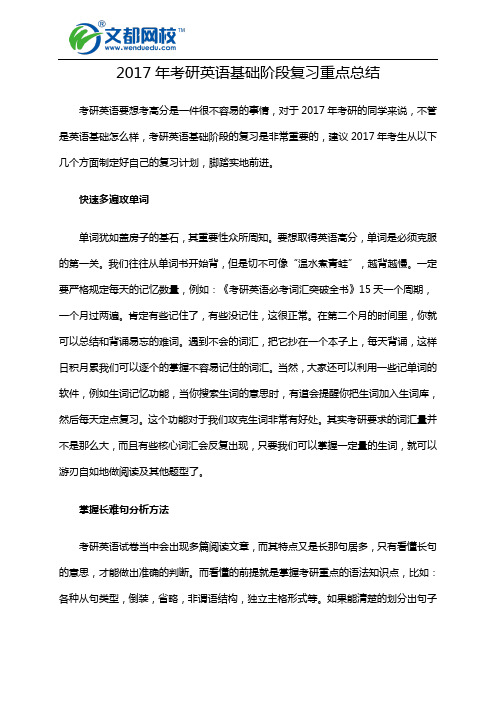
2017年考研英语基础阶段复习重点总结考研英语要想考高分是一件很不容易的事情,对于2017年考研的同学来说,不管是英语基础怎么样,考研英语基础阶段的复习是非常重要的,建议2017年考生从以下几个方面制定好自己的复习计划,脚踏实地前进。
快速多遍攻单词单词犹如盖房子的基石,其重要性众所周知。
要想取得英语高分,单词是必须克服的第一关。
我们往往从单词书开始背,但是切不可像“温水煮青蛙”,越背越慢。
一定要严格规定每天的记忆数量,例如:《考研英语必考词汇突破全书》15天一个周期,一个月过两遍。
肯定有些记住了,有些没记住,这很正常。
在第二个月的时间里,你就可以总结和背诵易忘的难词。
遇到不会的词汇,把它抄在一个本子上,每天背诵,这样日积月累我们可以逐个的掌握不容易记住的词汇。
当然,大家还可以利用一些记单词的软件,例如生词记忆功能,当你搜索生词的意思时,有道会提醒你把生词加入生词库,然后每天定点复习。
这个功能对于我们攻克生词非常有好处。
其实考研要求的词汇量并不是那么大,而且有些核心词汇会反复出现,只要我们可以掌握一定量的生词,就可以游刃自如地做阅读及其他题型了。
掌握长难句分析方法考研英语试卷当中会出现多篇阅读文章,而其特点又是长那句居多,只有看懂长句的意思,才能做出准确的判断。
而看懂的前提就是掌握考研重点的语法知识点,比如:各种从句类型,倒装,省略,非谓语结构,独立主格形式等。
如果能清楚的划分出句子的各个成分,并且了解每一种成分的作用和处理方法,我们就能对句意有一个准确的理解。
精析阅读真题“得阅读者得天下”,考研的江湖上一直流传这样一句话,绝非虚言。
所以在基础复习阶段必须要打好阅读的基础,精析阅读真题。
建议同学们做到以下几点:拿到一篇阅读真题,先自己读一遍,读的过程中标记出生词及不理解的句子,然后做题对答案,搞清楚每个题,为什么对,为什么错。
接下来就是解析真题:查出生词词义。
对长难句进行分析,理顺每句话的意思。
要做到文章中没有生词,没有难句。
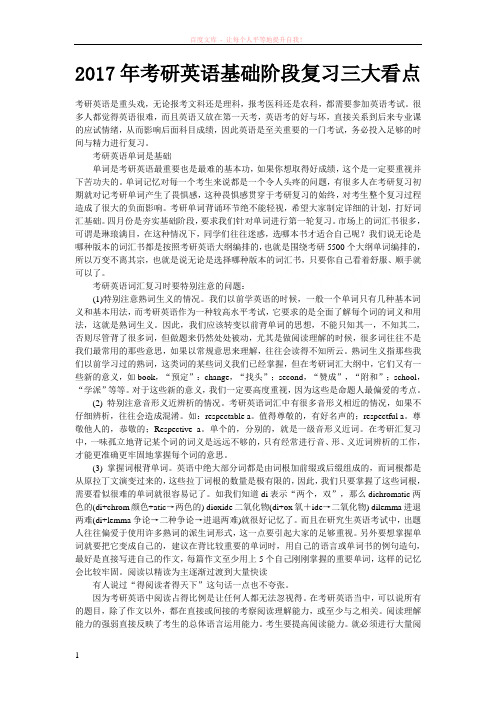
2017年考研英语基础阶段复习三大看点考研英语是重头戏,无论报考文科还是理科,报考医科还是农科,都需要参加英语考试。
很多人都觉得英语很难,而且英语又放在第一天考,英语考的好与坏,直接关系到后来专业课的应试情绪,从而影响后面科目成绩,因此英语是至关重要的一门考试,务必投入足够的时间与精力进行复习。
考研英语单词是基础单词是考研英语最重要也是最难的基本功,如果你想取得好成绩,这个是一定要重视并下苦功夫的。
单词记忆对每一个考生来说都是一个令人头疼的问题,有很多人在考研复习初期就对记考研单词产生了畏惧感,这种畏惧感贯穿于考研复习的始终,对考生整个复习过程造成了很大的负面影响。
考研单词背诵环节绝不能轻视,希望大家制定详细的计划,打好词汇基础。
四月份是夯实基础阶段,要求我们针对单词进行第一轮复习。
市场上的词汇书很多,可谓是琳琅满目,在这种情况下,同学们往往迷惑,选哪本书才适合自己呢?我们说无论是哪种版本的词汇书都是按照考研英语大纲编排的,也就是围绕考研5500个大纲单词编排的,所以万变不离其宗,也就是说无论是选择哪种版本的词汇书,只要你自己看着舒服、顺手就可以了。
考研英语词汇复习时要特别注意的问题:(1)特别注意熟词生义的情况。
我们以前学英语的时候,一般一个单词只有几种基本词义和基本用法,而考研英语作为一种较高水平考试,它要求的是全面了解每个词的词义和用法,这就是熟词生义。
因此,我们应该转变以前背单词的思想,不能只知其一,不知其二,否则尽管背了很多词,但做题来仍然处处被动,尤其是做阅读理解的时候,很多词往往不是我们最常用的那些意思,如果以常规意思来理解,往往会读得不知所云。
熟词生义指那些我们以前学习过的熟词,这类词的某些词义我们已经掌握,但在考研词汇大纲中,它们又有一些新的意义,如book,“预定”:change,“找头”;second,“赞成”,“附和”;school,“学派”等等。
对于这些新的意义,我们一定要高度重视,因为这些是命题人最偏爱的考点。
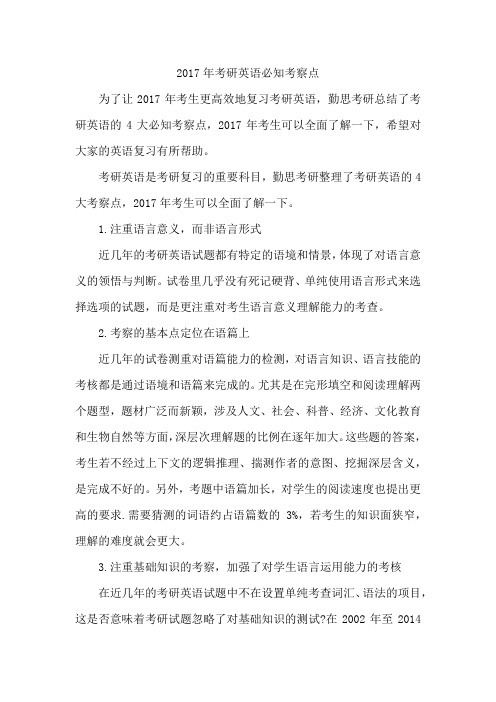
2017年考研英语必知考察点为了让2017年考生更高效地复习考研英语,勤思考研总结了考研英语的4大必知考察点,2017年考生可以全面了解一下,希望对大家的英语复习有所帮助。
考研英语是考研复习的重要科目,勤思考研整理了考研英语的4大考察点,2017年考生可以全面了解一下。
1.注重语言意义,而非语言形式近几年的考研英语试题都有特定的语境和情景,体现了对语言意义的领悟与判断。
试卷里几乎没有死记硬背、单纯使用语言形式来选择选项的试题,而是更注重对考生语言意义理解能力的考查。
2.考察的基本点定位在语篇上近几年的试卷测重对语篇能力的检测,对语言知识、语言技能的考核都是通过语境和语篇来完成的。
尤其是在完形填空和阅读理解两个题型,题材广泛而新颖,涉及人文、社会、科普、经济、文化教育和生物自然等方面,深层次理解题的比例在逐年加大。
这些题的答案,考生若不经过上下文的逻辑推理、揣测作者的意图、挖掘深层含义,是完成不好的。
另外,考题中语篇加长,对学生的阅读速度也提出更高的要求.需要猜测的词语约占语篇数的3%,若考生的知识面狭窄,理解的难度就会更大。
3.注重基础知识的考察,加强了对学生语言运用能力的考核在近几年的考研英语试题中不在设置单纯考查词汇、语法的项目,这是否意味着考研试题忽略了对基础知识的测试?在2002年至2014年的考研大纲中,都明确要求考生具备“在交际中更准确、自如地运用语法知识”这一语言能力。
由此可见,考研英语绝不是不注重基础知识的测试,而是考核形式改变了,考查要求更高了。
考研英语对基础知识的测试贯穿在整个英语考卷中。
完型填空题会直接考查语法知识;阅读理解题和英译汉中有大量的长难句,这些句子只有具备一定的语法知识才能正确分析;作文中要写出正确无误的句子,也需要语法知识做积淀。
因此,考研英语是从语篇角度测试考生对英语基础知识的运用能力。
4.注重选材的时代性和实用性考研试题的素材均选自英文原版书籍、英文主流媒体和英语国家经常阅读的书刊。

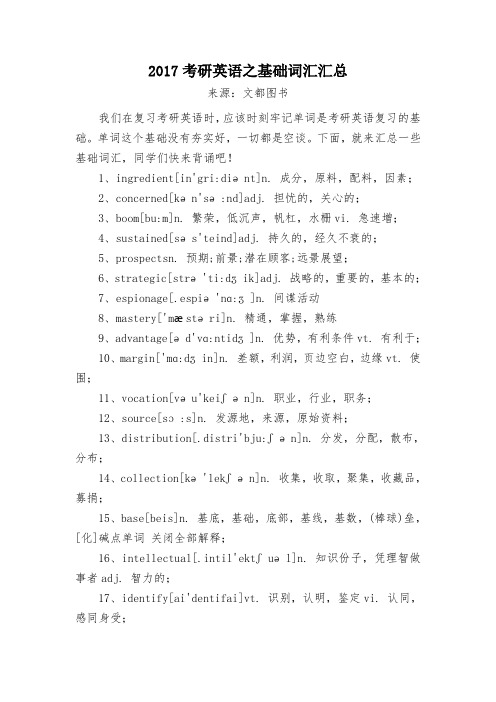
2017考研英语之基础词汇汇总来源:文都图书我们在复习考研英语时,应该时刻牢记单词是考研英语复习的基础。
单词这个基础没有夯实好,一切都是空谈。
下面,就来汇总一些基础词汇,同学们快来背诵吧!1、ingredient[in'gri:diənt]n. 成分,原料,配料,因素;2、concerned[kən'sə:nd]adj. 担忧的,关心的;3、boom[bu:m]n. 繁荣,低沉声,帆杠,水栅vi. 急速增;4、sustained[səs'teind]adj. 持久的,经久不衰的;5、prospectsn. 预期;前景;潜在顾客;远景展望;6、strategic[strə'ti:dʒik]adj. 战略的,重要的,基本的;7、espionage[.espiə'nɑ:ʒ]n. 间谍活动8、mastery['mæstəri]n. 精通,掌握,熟练9、advantage[əd'vɑ:ntidʒ]n. 优势,有利条件vt. 有利于;10、margin['mɑ:dʒin]n. 差额,利润,页边空白,边缘vt. 使围;11、vocation[vəu'keiʃən]n. 职业,行业,职务;12、source[sɔ:s]n. 发源地,来源,原始资料;13、distribution[.distri'bju:ʃən]n. 分发,分配,散布,分布;14、collection[kə'lekʃən]n. 收集,收取,聚集,收藏品,募捐;15、base[beis]n. 基底,基础,底部,基线,基数,(棒球)垒,[化]碱点单词关闭全部解释;16、intellectual[.intil'ektʃuəl]n. 知识份子,凭理智做事者adj. 智力的;17、identify[ai'dentifai]vt. 识别,认明,鉴定vi. 认同,感同身受;18、intellect['intilekt]n. 智力,理智,才智非凡的人,知识份子;19、proclaim[prə'kleim]vt. 正式宣布,公布,声明,赞扬,显示出;20、hostility[hɔs'tiliti]n. 敌意,敌对状态,公开战争。
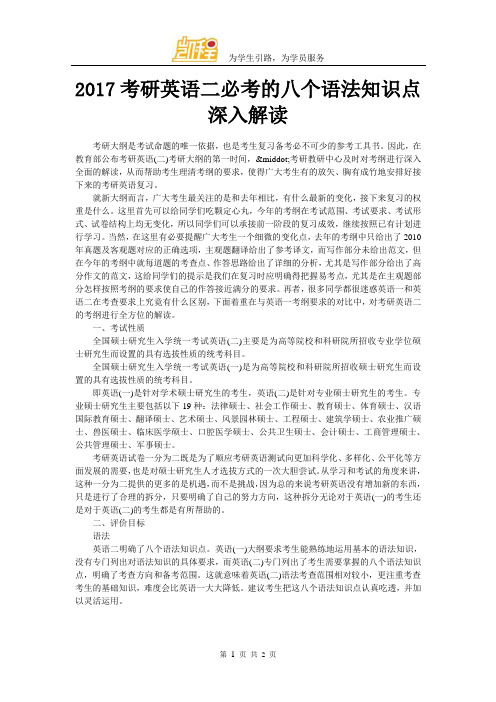
2017考研英语二必考的八个语法知识点深入解读考研大纲是考试命题的唯一依据,也是考生复习备考必不可少的参考工具书。
因此,在教育部公布考研英语(二)考研大纲的第一时间,·考研教研中心及时对考纲进行深入全面的解读,从而帮助考生理清考纲的要求,使得广大考生有的放矢、胸有成竹地安排好接下来的考研英语复习。
就新大纲而言,广大考生最关注的是和去年相比,有什么最新的变化,接下来复习的权重是什么。
这里首先可以给同学们吃颗定心丸,今年的考纲在考试范围、考试要求、考试形式、试卷结构上均无变化,所以同学们可以承接前一阶段的复习成效,继续按照已有计划进行学习。
当然,在这里有必要提醒广大考生一个细微的变化点,去年的考纲中只给出了2010年真题及客观题对应的正确选项,主观题翻译给出了参考译文,而写作部分未给出范文,但在今年的考纲中就每道题的考查点、作答思路给出了详细的分析,尤其是写作部分给出了高分作文的范文,这给同学们的提示是我们在复习时应明确得把握易考点,尤其是在主观题部分怎样按照考纲的要求使自己的作答接近满分的要求。
再者,很多同学都很迷惑英语一和英语二在考查要求上究竟有什么区别,下面着重在与英语一考纲要求的对比中,对考研英语二的考纲进行全方位的解读。
一、考试性质全国硕士研究生入学统一考试英语(二)主要是为高等院校和科研院所招收专业学位硕士研究生而设置的具有选拔性质的统考科目。
全国硕士研究生入学统一考试英语(一)是为高等院校和科研院所招收硕士研究生而设置的具有选拔性质的统考科目。
即英语(一)是针对学术硕士研究生的考生,英语(二)是针对专业硕士研究生的考生。
专业硕士研究生主要包括以下19种:法律硕士、社会工作硕士、教育硕士、体育硕士、汉语国际教育硕士、翻译硕士、艺术硕士、风景园林硕士、工程硕士、建筑学硕士、农业推广硕士、兽医硕士、临床医学硕士、口腔医学硕士、公共卫生硕士、会计硕士、工商管理硕士、公共管理硕士、军事硕士。

2017年考研英语 2017年考研英语备考已经开始,考⽣们在备考英语部分时,最先接触的是词汇部分,下⾯跨考教育英语教研室张⽼师为帮助考⽣更好的完成基础阶段的备考,从历年的真题中整理出了真题⾼频词组系列,希望能成为备考英语的利器。
张⽼师汇总了600多个⾼频词组,分为7个系列。
由于篇幅原因,本⽂内容为系列⼀。
1. yield to 对…屈服,投降,让步,顺从 2. be worthy of (=be deserving of)值得,够得上, 配得上 3. absence of mind(=being absent-minded) ⼼不在焉 4. absorb(=take up the attention of)吸引…的注意⼒(被动语态):be absorbed in 全神贯注于…be engrossed in;be lost in;be rapt in;be concentrated on;be focused on;be centered on 5. (be) abundant in(be rich in; be well supplied with) 富于,富有abound 6. access(to) (不可数名词) 能接近,进⼊,了解 7. by accident(=by chance, accidentally)偶然地,意外. Without accident(=safely) 安全地, 8. of one’s own accord(=without being asked; willingly; freely)⾃愿地,主动地 9. in accord with 与…⼀致. out of one’s accord with 同….不⼀致 10. with one accord (=with everybody agreeing)⼀致地 11. in accordance with (=in agreement with) 依照,根据 12. on one’s own account 1)为了某⼈的缘故,为了某⼈⾃⼰的利益2)(=at one’s own risk) ⾃⾏负责 3)(=by oneself)依靠⾃⼰ on account 赊账on account of 因为on no account 不论什么原因也不of …account 有…重要性 13. take…into account(=consider)把...考虑进去 14. give sb. an account of 说明, 解释(理由) 15. account for (=give an explanation or reason for) 解释, 说明. 16. on account of (=because of=in that) 由于,因为. 17. on no account(=in no case, for no reason)绝不要,⽆论如何不要(放句⾸时句⼦要倒装) 18. accuse…of…(=charge…with;blame sb. for sth.blame sth. on sb.;complain about)指控控告 19. be accustomed to doing(=be in the habit of, be used to)习惯于. 20. be acquainted with(=to have knowledge of) 了解; (=to have met socially) 熟悉 22. adapt oneself to(=adjust oneself to) 使⾃⼰适应于accomodate 23. adapt…(for) (=make sth. suitable for a new need) 改编, 改写(以适应新的需要) 24. in addition (=besides) 此外, ⼜, 加之 25. in addition to(=as well as, besides, other than)除…外 26. adhere to (=abide by, conform to,comply with,cling to,insist on,persist in,observe,opinion,belief ) 粘附; 坚持, 遵循 27. adjacent(=next to, close to) 毗邻的, 临近的 28. adjust..(to) (=change slightly)调节; 适应;adapt 29. admit of (=be capable of, leave room for) …的可能,留有…的余地. 30. in advance (before in time) 预告, 事先. 31. to advantage 有利的,使优点更加突出地. 32. have an advantage over 胜过. have the advantage of 由于…处于有利条件 have the advantage of sb.知道某⼈所不知道的事 33. take advantage of (=make the best of, utilize, make use of, profit from, harness)利⽤. 34. agree with 赞同(某⼈意见) agree to 同意 35. in agreement (with) 同意, ⼀致 36.ahead of 在…之前, 超过…;……………. ahead of time 提前. 37. in the air 1)不肯定, 不具体. 2)在谣传中. 38. above all (=especially, most important of all) 尤其是, 最重要的. 39. in all (=counting everyone or everything, altogether) 总共, 总计 40. after all 毕竟到底(not)at all ⼀点也不all at once(=suddenly)突然once and for all 只此⼀次above all 最重要的'first of all ⾸先all in all ⼤体上说be all in 累极了all but ⼏乎 41. allow for (=take into consideration, take into account) 考虑到, 估计到. 42. amount to (=to be equal to) 总计, 等于. 43. answer for (undertake responsibility for, be liable for, take charge for) 对…负责. 44. answer to (=conform to) 适合,符合. 45. be anxious about 为…焦急不安; 或anxious for 46. apologize to sb. for sth. 为…向…道歉 47. appeal to sb. for sth. 为某事向某⼈呼吁. appeal to sb. 对某⼈有吸引⼒ 48. apply to sb. for sth. 为…向…申请; apply for 申请; apply to 适⽤. 49. apply to 与…有关;适⽤ 50. approve of(=consent to,be in favor of,favor,agree to,consider good,right)赞成,批准 51. arise from(=be caused by) 由…引起. 52. arrange for sb./sth. to do sth. 安排…做… 53. arrive on 到达; arrive at 到达某地(⼩地⽅);得出,作出; arrive in 到达某地(⼤地⽅); 54. be ashamed of (=feel shame, guilt or sorrow because of sth. done) 以…为羞耻 55. assure sb. of sth. (=try to cause to believe or trust in sth.) 向…保证, 使…确信. 56. attach(to) (=to fix, fasten; join) 缚, 系,结 57. make an attempt at doing sth. (to do sth.) 试图做… 58. attend to (=give one’s attention, care and thought)注意,照顾; attend on(upon)(=wait upon, serve, look after) 侍候,照料 59. attitude to/ toward …对…的态度.看法 60. attribute…to…(=to believe sth. to be the result of…)把..归因于.., 认为..是..的结果 61. on the average (=on average, on an average) 平均 62. (be) aware of (=be conscious of , having knowledge or consciousness)意识到,知道. 63. at the back of (=behind) 在…后⾯ 64. in the back of 在…后部(⾥⾯);on the back of 在…后部(外⾯); be on one’s back(=be ill in bed) 卧病不起 65. at one’s back(=supporting or favoring sb.)⽀持,维护;have sb.at one’s back 有…⽀持 66.turn one’s back on sb.(=turn away from sb. in an impolite way) 不理睬(某⼈),背弃,抛弃 67. behind one’s back 背着某⼈(说坏话) 68. be based on / upon 基于 69. on the basis of 根据…, 在…基础上 70. beat…at 在…运动项⽬上打赢 71. begin with 以…开始. to begin with (=first of all) ⾸先, 第⼀(经常⽤于开始语) 72. on behalf of (=as the representative of) 以…名义 73. believe in(=have faith or trust in; consider sth./sb. to be true) 相信,依赖,信仰. 74. benefit (from) 受益,得到好处. 75. for the benefit of 为了…的利益(好处) 76. for the better 好转 77. get the better of (=defeat sb.) 打败, 胜过. 78. by birth 在出⽣上,论出⾝,按⾎统at birth 在出⽣时; give birth to 出⽣ 79. blame sb. for sth. 因…责备某⼈. blame sth. on sb. 把…推在某⼈⾝上 80. in blossom 开花(指树⽊) be in blossom 开花(强调状态) come into blossom 开花(强调动作) 81. on board 到船上, 在船上, 上⽕车或飞机 82. boast of (or about) 吹嘘 83. out of breath 喘不过⽓来 84. in brief(=in as few words as possible)简⾔之 85. in bulk 成批地,不散装的 86. take the floor 起⽴发⾔ 87. on business 出差办事. 88. be busy with sth.于某事。

凯程考研集训营,为学生引路,为学员服务!第 1 页 共 1 页 2017考研英语:你需要知道的常识 说到考研,每个人心里第一反应肯定就是:啊?好难的,我该怎么办啊,其实考研没有大家想象中的那么难。
虽然它并不容易,但是,只要大家掌握了一定的方法并且有一定的恒心,成功的几率还是蛮高的。
在这段漫长的考研路中,大家难免会面临着这样或那样的疑惑,特别是英语,这个被称作考研第一大杀手的科目。
不过大家不要怕,贴心的王老师这就来为大家总结一下英语复习的小经验,希望能够给2017考研人带去帮助。
一.单词书怎么挑选?同学们在单词书的挑选上,总是会陷入一个误区,认为单词量越多的越好,单词释义越多的越好;其实不然,考试大纲里规定的单词量和你真正能够使用上的单词量有一些出入;因为考试大纲中规定的单词有一部分是你之前就学过的,对于那些单词,同学们大可不必放在心上。
应该着重复习新单词,我们在挑选单词书的时候应该挑那种简单一些的,不要太过繁琐;如果买了那种对一个单词作大段解释,后面又有中英文对照解释、词语搭配、词根分析,甚至还有一系列近义词、反义词、同词根词汇的单词书,这样的单词书,你背几天就会感觉快要疯了。
二.完型是不是不重要?每一年的考研人难免会陷入一个误区,认为完形填空分值小,在复习当中不是很重要,而且它的难度又比较高,所以大部分人会选择放弃完型填空。
这种想法应该彻底的杜绝,因为现在刚刚是你考研的初期阶段,你如果在现在就开始有选择性的去复习,并且把分值小的题型都放弃了的话,那么你最后很难会取得成功。
更何况你又没有去尽力的尝试,你怎么知道自己征服不了它?连试过都没有就选择放弃,那是失败者的做法。
其实完型填空它麻雀虽小但是五脏俱全,它里面包含了很多英语必备常识,比如基础词汇、语法知识和固定搭配等等,我们只要掌握了完型填空,你就等于掌握了其他的题型,所以,同学们在英语的复习中要重点复习完型填空。
这些就是王老师为大家总结的一些小经验,希望能够给大家带去一些帮助,为大家指点了迷津。

考研英语十二大基础语法体系对于任何英语句子,要分析其结构,这样才能找到英语语言的规律。
每种语言都有它的难点,汉语的难点在于汉语不是拼读语言,汉字很难写,而且有四种声调。
其实,许多接触过多种外语的人都认为,英语的语法比法语、德语、俄语、日语等都简单,是最容易学的。
著名语言学家乔姆斯基说过,语法是内生的、也就是随着语言的诞生而诞生的。
因此,学习语法和学习语言是相辅相成的。
一、英语动词的时态(一)英汉两种语言在时态表达方式上的差异:英语的词类与汉语的不同。
汉语词类形态稳定,比如“书”这个字,“一本书”、“三本书”都一样,没有词形变化。
英语就不同了,book, books仅从词形上就能知道是单数还是复数。
动词是英语中变化最多、最复杂的词类。
有人说,学好英语就是学好动词,此言甚是。
同一个动作或状态分别在不同时间发生或存在,表达这个动作或状态的动词就要用不同的形式,这就是时态。
(二)英语动词的形式:英语的时态是通过动词的变化来体现的。
因此,了解动词的形式及其变化规律非常重要。
英语的实义动词有以下五种形式:(1)动词原形:动词原形在句子中形式不变。
主要用于主语为非第三人称单数的一般现在时,情态动词之后,或根据语法规定必须用动词原形的其他情况。
(2) 一般现在时第三人称单数形式(简称现单三):主要用于主语为第三人称单数的一般现在时。
(3) 过去式:主要用于一般过去时。
(4) 现在分词:主要用于进行时态,或语法规定的其他情况。
(5) 过去分词:主要用于完成时态,或语法规定的其他情况。
词尾变化(规律与名词变复数相同,读音也与名词复数相同)举例一般加-s Help---helps; read---reads在ch, sh, s, x 或元音字母o后面加-es Do, fix, pass, push, teach ---does, fixes, passes, pushes, teaches以辅音字母加y结尾的词,变y为i再加-es Try, study --- tries, stuides词尾变化举例词尾读音动词后面加-ed Help---helped Work---workedWatch---watched清辅音之后读[t] Want---wanted need---needed [t] ,[d]之后读[t] Turn---turned play--played元音和浊辅音([d]除外)之后读[d]以不发音的“e”结尾的词,加-d Love---loved Serve---served结尾是辅音字母+y时,y变i,再加-ed Study---studied Try---tried结尾只有一个辅音字母的重读闭音节词,双写辅音字母再加-ed Stop---stoppedDrop---dropped清辅音之后读[t]母组合的不规则动词有一定的规律。
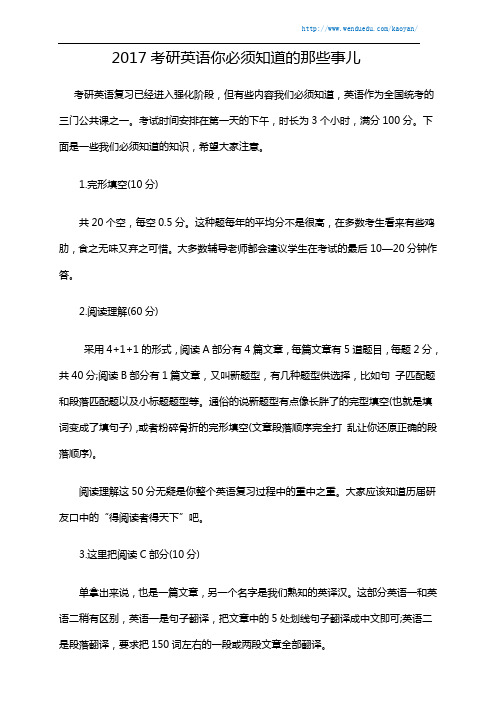
2017考研英语你必须知道的那些事儿考研英语复习已经进入强化阶段,但有些内容我们必须知道,英语作为全国统考的三门公共课之一。
考试时间安排在第一天的下午,时长为3个小时,满分100分。
下面是一些我们必须知道的知识,希望大家注意。
1.完形填空(10分)共20个空,每空0.5分。
这种题每年的平均分不是很高,在多数考生看来有些鸡肋,食之无味又弃之可惜。
大多数辅导老师都会建议学生在考试的最后10—20分钟作答。
2.阅读理解(60分)采用4+1+1的形式,阅读A部分有4篇文章,每篇文章有5道题目,每题2分,共40分;阅读B部分有1篇文章,又叫新题型,有几种题型供选择,比如句子匹配题和段落匹配题以及小标题题型等。
通俗的说新题型有点像长胖了的完型填空(也就是填词变成了填句子),或者粉碎骨折的完形填空(文章段落顺序完全打乱让你还原正确的段落顺序)。
阅读理解这50分无疑是你整个英语复习过程中的重中之重。
大家应该知道历届研友口中的“得阅读者得天下”吧。
3.这里把阅读C部分(10分)单拿出来说,也是一篇文章,另一个名字是我们熟知的英译汉。
这部分英语一和英语二稍有区别,英语一是句子翻译,把文章中的5处划线句子翻译成中文即可;英语二是段落翻译,要求把150词左右的一段或两段文章全部翻译。
这个题看似简单,其实在整个英语试卷中得分率很低,多年平均分都是3分上下。
因为很多人在考场上写出来的中文基本都不是人话。
4.写作分为A部分和B部分(30分)简单说明一下,在这4部分中,阅读理解的A部分和B部分再加上写作部分一共占了80分,绝对是复习的重点。
完形填空和翻译占20分,可以说是复习的难点。
平时模拟题可以拿来稍微练练手,重点还是应该放在真题上。
英语学科前期需要投入大量时间精力夯实基础。
复习当然是开始得越早越好。
在这儿先简单列一个时间规划供大家参考,小伙伴们可以根据自己的实际情况自行调整。
1.基础复习阶段(决定考研——2016年6月)这个阶段关键词是夯实基础。

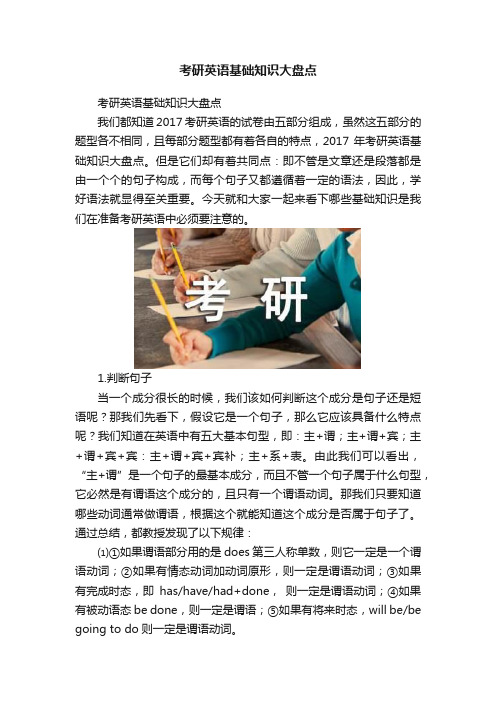
考研英语基础知识大盘点考研英语基础知识大盘点我们都知道2017考研英语的试卷由五部分组成,虽然这五部分的题型各不相同,且每部分题型都有着各自的特点,2017年考研英语基础知识大盘点。
但是它们却有着共同点:即不管是文章还是段落都是由一个个的句子构成,而每个句子又都遵循着一定的语法,因此,学好语法就显得至关重要。
今天就和大家一起来看下哪些基础知识是我们在准备考研英语中必须要注意的。
1.判断句子当一个成分很长的时候,我们该如何判断这个成分是句子还是短语呢?那我们先看下,假设它是一个句子,那么它应该具备什么特点呢?我们知道在英语中有五大基本句型,即:主+谓;主+谓+宾;主+谓+宾+宾:主+谓+宾+宾补;主+系+表。
由此我们可以看出,“主+谓”是一个句子的最基本成分,而且不管一个句子属于什么句型,它必然是有谓语这个成分的,且只有一个谓语动词。
那我们只要知道哪些动词通常做谓语,根据这个就能知道这个成分是否属于句子了。
通过总结,都教授发现了以下规律:⑴①如果谓语部分用的是does第三人称单数,则它一定是一个谓语动词;②如果有情态动词加动词原形,则一定是谓语动词;③如果有完成时态,即has/have/had+done,则一定是谓语动词;④如果有被动语态be done,则一定是谓语;⑤如果有将来时态,will be/be going to do则一定是谓语动词。
⑵d oing和to do是不能做谓语动词的。
⑶那如果是动词原形,是不是谓语呢?此时,我们就需要进行判断了。
如果是动词原形或者是过去式,就是谓语动词;如果是分词形式,就不是谓语动词。
2.举例什么意思呢?为了更方便理解,我们可以通过后面的'两个句子进行学习、体会,考研英语《2017年考研英语基础知识大盘点》。
①The book used last year is out of date.②The accident happened last year is terrible.第一个句子是分词做后置定语。